#something about how the narrative was doomed from the beginning but I still observed in denial
Explore tagged Tumblr posts
Text
Something about Powder being happy in a universe without Vi. Something about Violet getting a happy ending in a universe without Jinx. Something about how their happiness together was short lived and fleeting. Something about how they were never meant to stay together as much as they belonged together. Something about how they couldn’t let go regardless. Something about how the memory of the other was the only thing the sisters could ever truly keep. Something about how their family was destined to be broken, and that their peace came with acceptance.
#arcane#arcane spoilers#arcane league of legends#arcane jinx#arcane vi#violet arcane#powder arcane#vi and jinx#vi and powder#something about how I’m uncontrollably sobbing#something about how the narrative was doomed from the beginning but I still observed in denial#can we just take vi and cait from one universe and plop them in the other?#complete my happy family?#Ekko too if he wants but his strong set of morals might keep him where he is so he can rebuild
81 notes
·
View notes
Text
observations on yuyuko tanaka and her penchant for playing dudes who die or are on the cusp of death constantly, whether by her own hand or just some silly little fate, and also how it's contrast to rui almost always being blessed with life (that's also given to her by yuyuko's hand or some silly little fate).


or: yuyuko "doomed by the narrative (that she wrote herself)" tanaka + rui "blessed by the narrative (that yuyuko writes for her)" akikaze.
so as said, a while back i noticed that yuyuko's roles are almost all like. guys who brush with death/just outright die die. i went down the roles she has in just her cards and listed them all down on my priv twitter and it looked like:
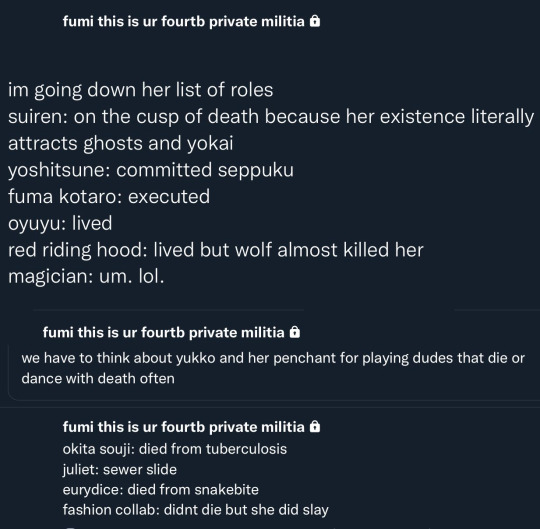
so a good like. 2/10 roles that don't end badly.
i ended up rereading like. basically almost every rmk story out there, from the earliest ones available and uhm. so.
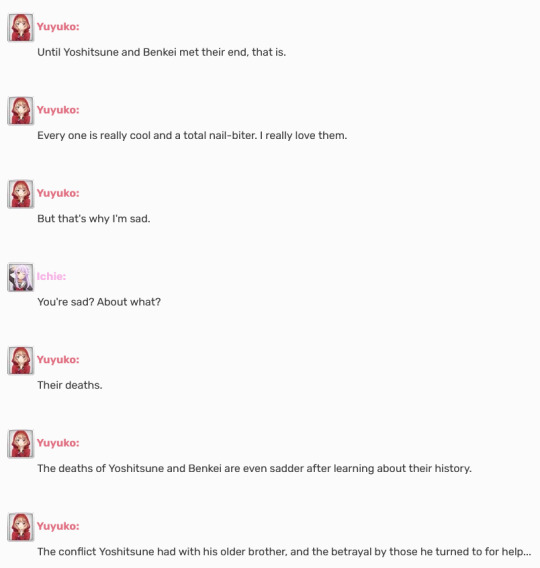
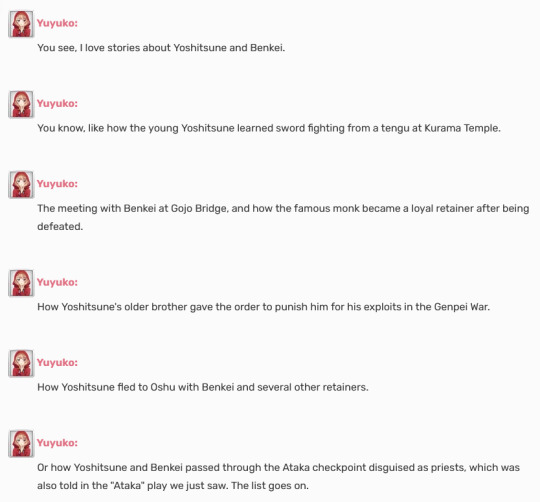
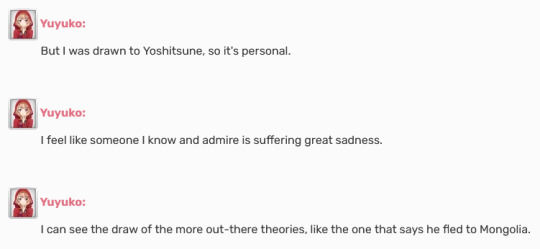
(purple clouds of the afterworld chapter 5)
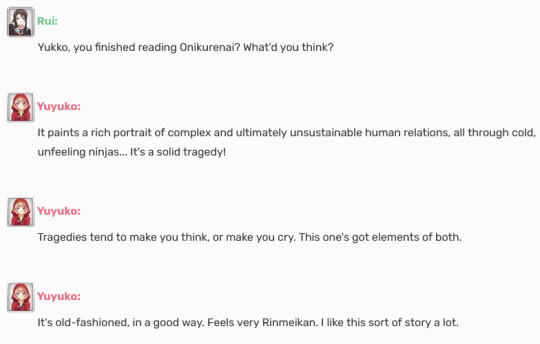
(tales of onikurenai chapter 2)
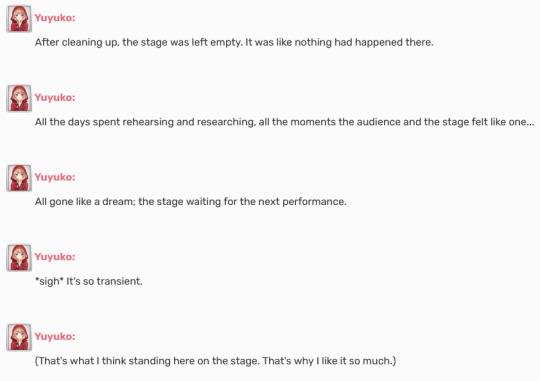
(shibahama final chapter)
all of these are from events pre-downfall (not sure about shibahama but i def know the other ones are). yuyuko's always been fond of tragedies.
obviously this manifests in a lot of her scripts (ghost patrol story rerun, shinsengumi rinpuden, her influence on arcana arcadia's script, and most importantly, rinmeiki), but what i think is interesting is that she saves a lot of the worst fates for herself.
in ghost patrol, whilst fumi and ichie's characters have some tragic interpersonal drama/trauma, it sorts itself out by the end. but yuyuko's character's entire existence attracts danger, death at every turn.
shinsengumi rinpuden has her portray okita soji. fumi describes the story to yuyuko as such:
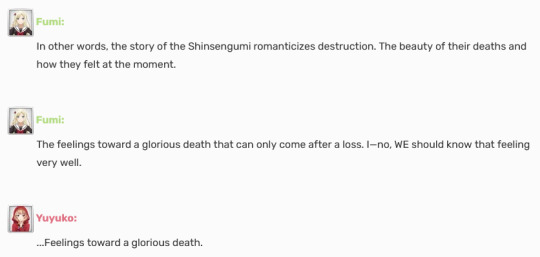
(okita soji yuyuko bond story 1)
the romanticization of destruction. that feeling of knowing that you died a glorious and honourable death. and what role does yuyuko give herself? what does she do with herself?
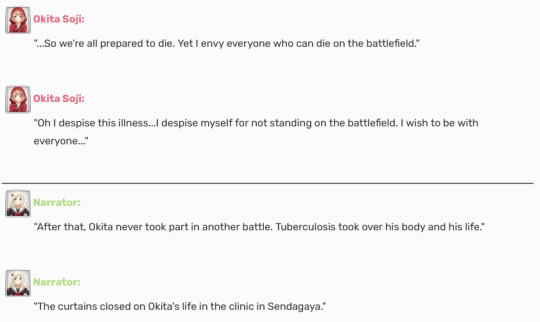
die in the antithesis of it. if read as fumi described, the most pathetic death she could have.
i'd go into rinmeiki but that's a beast all on its own, and is mostly rooted in the characters themselves, and not character exploration through them acting as something else. there isnt even much of a script of it ingame, in the sense of the rest of the other examples, so i'll move onto arcana arcadia.
whether a quirk of the fact she was picked as the magician and it was planned from the beginning, or the fact that she is part of the scriptwriting team and therefore has some measure of control on her character, the magician has one of the worst fates in aa, quite literally selling her soul to the devil and damning herself to hell forever, all done by her own hand. she willingly damned herself.
interestingly in these same stories, the things she gives to rui's roles, is life.
kiichi miroku in ghost patrol is still quite equal to abe no suiren, but it's not her that's constantly attracting ghosts.
hajime saito was one of the two survivors of shinsengumi rinpuden. while he didn't have a role to play alive unlike fumi's nagakura shinpachi, hajime saito was still left alive, and given to rui.
now, the hanged man. which at this fucking point is hilariously on the nose, as the magician damns herself to ensure that the hanged man lives and changes the world, a human saving humans and not humans relying on god to save them. she gives up her hopes, her life AND her afterlife for him. the caveat being, if he decides to accept her offer of "becoming the main character". which he does. and while the path he chose by taking up the magician's offer still leads him to hell, he still leaves with his life and a goal to chase, a world to change. it is the magician that pushes the hanged man forward into making something of himself, of the world he lives in, and she herself is only one little spark to light the fire.
indeed, yuyuko is constantly reliving the transience of the stage that she is so fond of. but she does not extend this transience to rui. yuyuko is happy to die over and over again, but rui. rui must live. well, of course she must, yuyuko loves her.

like the hanged man and the magician, yuyuko would give up her life for someone so dear to her.
...
...
so anyways remember when ichie said this in arcana arcadia?
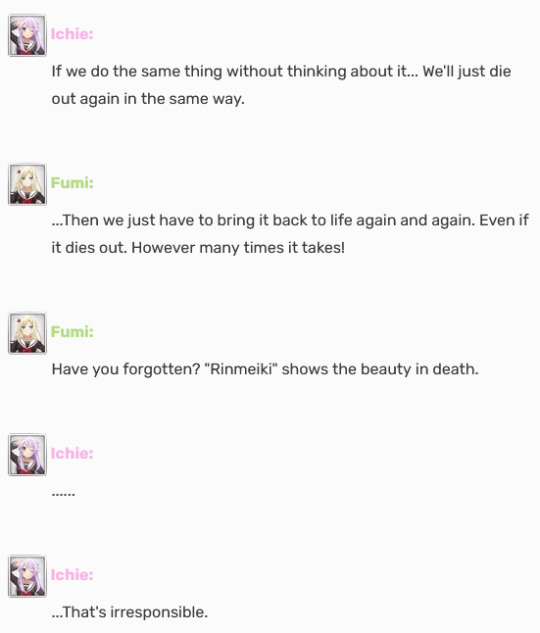
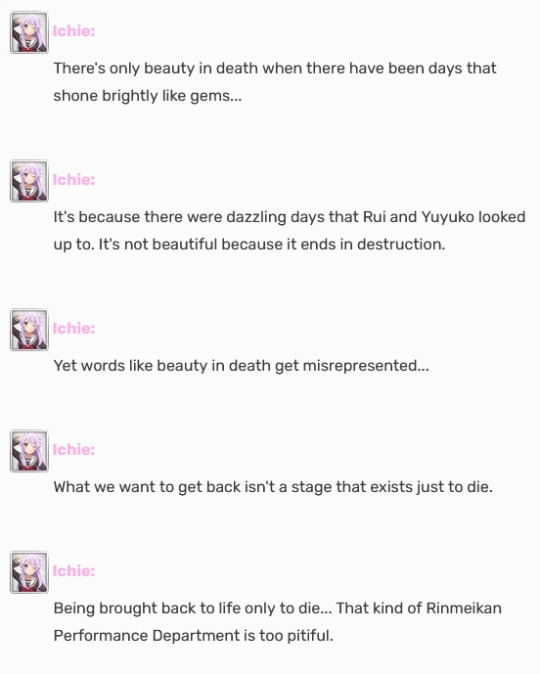
there's a difference in the cyclical deaths that yuyuko and fumi are portraying though, in that fumi dies over and over again to try and regain the past, whilst yuyuko plants her feet firmly in the present and dies over and over again for someone else's future.
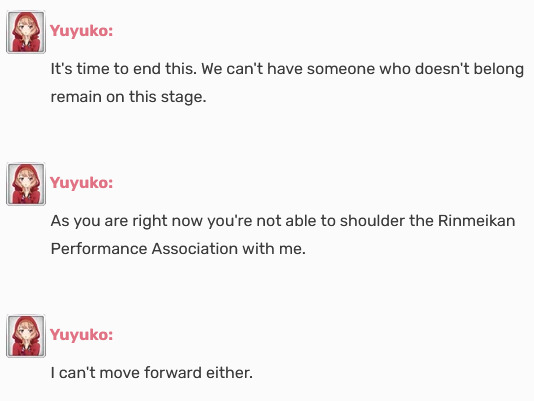
she moves forward only when rui does, and in magician stories she does even tell nana that she'll decide to be rui's producer so she can make her into the best stage girl that akikaze rui can be. but what about her? she seems to understand that stage girls must keep moving on, keep moving forward towards the future with unparalleled hunger, but as of right now it appears that she has put herself in an odd stasis. she moves when rui does, she dies when rui does. it's an existence as a stage girl that cannot entirely continue.
this dependence can keep one going for a while, but it cannot last forever. could yuyuko move forward without rui walking the path beside her? could rui move forward without yuyuko's silent support? if the ties between them are severed, would they bleed out and die?
well, only time will tell. i patiently await what story is to be told in their futures.
though i will say, to be separated like this isn't entirely a tragedy. what they've gained from each other will follow them for the rest of their lives. even apart, everyone is still together.


tl:dr: hey little dude. why do you keep dooming yourself in narratives that you have control over. and why do you keep giving the big guy you love narratives that favor his life.
#revue starlight#starira#rui akikaze#yuyuko tanaka#yuyurui#ruiyukko#Emile begins casting Coherence.#i wanted to say more abt how yuyuko loves to melt into the background and basically be an invisible storyteller#and also how she's uhm. very much nana's protege. in a potentially bad way depending on how this goes in the future#but it's already getting so long and it's already getting so late so you're having this for now.
166 notes
·
View notes
Text

[6]
It’s been a while (years?) since this the last world where he could do this but I absolutely adore when Fai comes out and says all the detailed observations about the location outloud. THANK YOU FAI I LOVE IT.
I'm also THRILLED that Yukito is back in the narrative, if only in reference. Yet another tie back to the beginning of the manga and a reason to remember everything that happened in Chapter 1 to prepare for whatever follows this moment.
Though it’s interesting that Sakura was being prepared to take over the position of High Priest, considering Yukito knew she wasn’t really going to be available for that, and presumably so did Clow. Did Yukito just go along with it so that Sakura didn’t know what her future would be like? Or is there still some time shenanigans in play here and this is from an alternate place in time where they DIDN’T know about Sakura’s tragic fate?
We just don’t know!
(just kidding it’s only me)

MOKONA CRACKED THE CASE!
Our little detective trying so hard to contribute to the plot HAS DONE IT! She asked the question that unlocked the backstory. I’m so proud.
And the DARKNESS in that panel when Lava Lamp says Always! The tragedy! The drama! OOH I love it.
However the possibility of further timeline shenanigans are swinging right around back to 100% oh dear god here we go
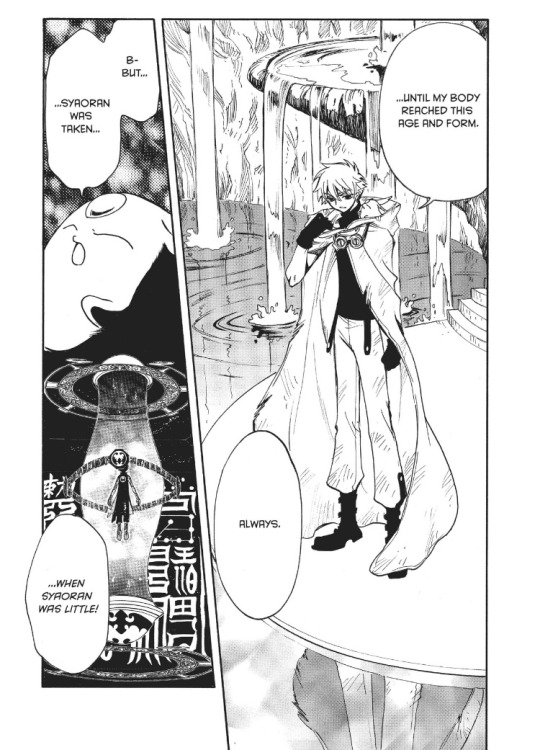
OH GOD EVERYONE HOLD ON TO SOMETHING WE’RE PLUNGING OFF THE CLIFF INTO OUR DOOM HERE WE GO
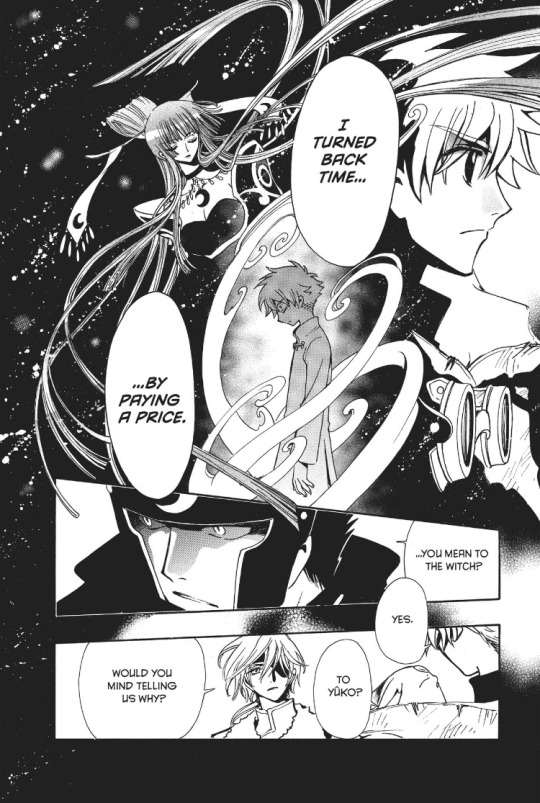

AHHHHH GOD DAMNIT
NOW HOW AM I SUPPOSED TO KEEP TRACK OF A SINGLE THING THAT HAS EVER HAPPENED?
#PLEASE HOLD#PLOTLINE PROCESSING#Liveblogging the Reservoir Chronicle#Vol 188#Tsubasa#Lava Lamp Guy#Sakura#Sakura 1 or Sakura 2? Sakura 0?#Mokona#Kurogane#Fai#And TIME TRAVEL#Ok ok ok ok ok okokokokokok#Okkkkkkkkkkkkkkkkkkkkkkkkkkkk
64 notes
·
View notes
Text
On the topics of the past… and the future… and hot billionaires.
Before we begin, this post contains some spoilers about Chapter 4. So, I please ask you to go through the new update before reading through this and sharing your thoughts. Thank you.
Now...
Let me begin by saying that the plot of this game has been set in stone since very early on. The existence of the Broken King, what Seeker is ‘seeking’, the secrets behind Forlorn and Aki, where exactly your and Lat’s powers come from, these are all things that I have decided on, and that won’t change at all.
However, as I have been writing, and beginning to think more and more of how I want certain… events in the game’s climax to happen, I hit a rather large roadblock.
The one thing that I have maintained is absolutely a message of this story is how a person’s past can shape them. Your past marks you, and it changes you, but it does not define you. It does not deserve to do that, and you should never let it.
And there’s certain characters that absolutely exemplify those statements, or will have to deal with them one way or the other. Most of them, I have perfectly clear plans on how I shall show it through.
But there exists an exception, and it is most prominent in one of the scenes at the game’s penultimate chapter. No matter how I approached it, or how I attempted to tackle it, I was unable to give it the weight it deserved, or the weight it needed, because it had been hamstrung by a decision I made while writing the second chapter of the game.
A decision I am now changing, not to the way it was originally, but to a way that I find more personally fulfilling, and, if you are particularly… observant, let’s say, you can already begin to make guesses at it with a certain scene in Chapter 4.
That is to say, if you are romancing Ignis, and you meet with her in Chapter 4, you are shown a lot of red flags.
That is intended, because the Ignis romance is doomed to failure.
This isn’t a decision I’ve made lightly, but it is one that I will stand by. I won’t explain why, exactly, it is doomed (you’re free to guess, of course, though I suspect there’s little chance it’ll become entirely clear before the endgame), but it failing is something that will happen. No ifs or buts.
Now, that’s not to say I’m cutting the entire plotline of romancing Ignis out of the game. You’ll still get a romance, of sorts, and specific scenes as you attempt a relationship, but… Well. I’d rather not repeat it.
I shall try my best to make it a narratively convincing path, and one that is worthy of exploring, even if not your preferred choice.
I hope you understand, and can offer me the modicum of trust needed when I say that it’s something I shall tackle with as much vigour as possible.
22 notes
·
View notes
Text
Undertale Multiverse Classpects Part 1/??
It’s inevitable once I get super into something that I do this.
I will most likely do more characters but for now I started with just some of the biggest characters of the multiverse/underverse specifically.
Explanations will be under the cut. Long, long, explanations. (Almost 3k words!)
Error: Bard of Time Ink: Rogue of Space Nightmare: Knight of Doom Dream: Page of Life Cross: Witch of Blood XChara: Prince of Heart XGaster: Thief of Light
Most of this was done using the theories of 0pacfica, whose amazing classpect theory posts can be found on Ao3 here:
https://archiveofourown.org/series/1960270
Though this was also cross referenced with bladekindeyewear’s older theories (particularly on the roles of the classes and active/passive pairs) and a sprinkling of the extended zodiac.
So this is another classpect where it’s actually easier to do in pairs for a lot of the characters due to how intertwined they are.
Error: Bard of Time
Ink: Rogue of Space
When starting with these two, it really was a giant debate between me and my friends about whether Ink and Error were time and space or hope and rage. It was very hard to move away from Hope/Rage when it represents unchecked creation and destruction which...is pretty much the entire backbone of underverse, but after lots of back and forth we found Time and Space fit better overall.
It’s useful to think of Space as Beginnings and Time as Endings. Ultimately what Ink does is facilitate a bunch of new beginnings. Ink is also all about the growth of the multiverse, which is the closest analogue we really have to Skaia. Hope may be creation, but it is creation as counter to the greater narrative, and often counter to Skaia and the reproduction of the universe. On the flip side, Rage, while being destruction, is generally destruction of anything non-fundamental. Error, by contrast, does not care what is being destroyed. His goal is ultimately the end to the multiverse itself; the end of the narrative. Time and Space are also the main building blocks of the universe and without them sessions become void. Ink and Error ultimately represent the core of the multiverse and are also key in most of the big multiverse spanning stories. As well, there’s really no escaping how similar Error and Caliborn act in both personality and actions.
Finally, looking at the extended zodiac, even their personalities fit decently well, though mostly Ink and Space. While classpect is actually much more about narrative arcs and roles than personalities, it’s still useful to look at the most personality based descriptions of the extended zodiac. Space has the description ‘They are patient, masters of the art of 'wait-and-see', and are inclined to take things as they come. That isn't to say that they're pushovers or willing to let injustice lie-they just choose their battles wisely, understanding that sometimes you have to let something burn to the ground in order to build it back better and stronger than before. To this effect, they tend to be innovators, concerned with creation and redemption.‘ and if that doesn’t describe Ink in underverse at least, then nothing else does. Time is a little less fitting personality wise for Error, but these few bits are pertinent: ‘Their lives are often marked by struggle, not so much because fate has it in for them, but because they are fundamentally incapable of just accepting things as they come.’ ‘At their worst they are ruthless, defensive, and impulsive.‘
So now that Aspect is out of the way, I can explain classes. Let’s start with the easy one first. There’s no way we could have Error as anything other than a destroyer class, so Bard or Prince had to be one of the titles. Then from there it comes down to whether Error is active or passive. While it may be easy to say ‘well he actively destroys things’ it’s useful to remember someone's powers can look very similar even if active or passive. My go to for this is Roxy who despite being a passive void class, ultimately can still actively steal nothingness from concepts.
And I have to ask- does Error really actively use his aspect? Because I don’t think so. There’s a popular fan concept of Error as a ‘Forced god of Destruction’ that I think really cements this. Time as an aspect tends to also represent Fate, and if there’s a character who has been actively fucked over by Fate, it’s Error. Even from his time as Genos, Error has been the butt monkey of terrible circumstances. 0pacifica talks about ‘Student’ classes (Thieves, Seers, and Bards) as one where the aspect changes the player, and if that doesn’t describe Error just.
Also it gives Error a codpiece and isn’t that just fucking perfect.
So onto the harder class to explain- Ink being a Rogue. Unlike the Destroyer class, there’s no ‘Creator’ class to nicely fit Ink into (although some suspect that the Heal class of Sylph and most likely Maid class can double as both Heal and Create) but even then, Ink doesn’t really actively create. Rather he tends to try and inspire creators to create. For Ink it made more sense to use 0pacifica’s chart to lower down the class, and then make sure the powers still fit from there.
To start with, there’s no way Ink is anything but a mutualist class. Both Ink and the multiverse benefit from Ink’s role in the multiverse. But even more telling that Ink is a mutualist class is the line in the flowchart ‘The story is not complete until I have accomplished what I have set out to do or found another way to satisfy my initial impulse.’ From the start of Underverse at least to now (though I also suspect to the end of Underverse) the story has been driven by Ink’s actions and motivations. There wouldn’t be a story without him, for good or ill.
From there using the chart, it was easy to lower it down to Rogue or Knight. Ink really isn’t changed or used by their aspect, unlike Error. So it really comes down to does Ink use his aspect or change his aspect. From here I really like 0pacifica’s one sentence descriptions. Rogue is ‘I change my aspect to a more useful form’ while Knight is ‘I use my aspect like a tool’. Eventually we decided on Rogue because Ink doesn’t really actively use his aspect- he’s much more about inspiration- allowing others to steal his ideas, if you will ;P. He ultimately changes other beginnings in service both to the multiverse and himself- squeezing them for paint so he can keep feeling.
Also Rogue just kind of fits Ink’s aesthetic with that cute little bandit mask
What’s really cool is these two classes are also on opposite ends of the ‘Reinvent/Change’ segment of the class chart.
Hopefully this is the longest segment..
Nightmare: Knight of Doom
Dream: Page of Life
Here’s another pair we really had to decide between Hope/Rage for and Doom/Life. But honestly there wasn’t actually a lot of debate. If Doom is Stasis and Inertia, then that fits Nightmare’s ultimate goal to a T. If Nightmare gets his way, the entire multiverse will be plunged into negativity, and with no contrast, everything would just be mired in the same. In contrast to both Nightmare and in particular, Ink, Dream is all about growth and making things better. Joku has specifically stated that Dream and Ink had a falling out due to this- Dream doesn’t care about creator intentions or their story. If there is someone suffering, Dream wants to fix it.
Another way these two fit is in something 0pacifica observes regarding Doom and Life players- Life players come from ‘the top of the pile’ with every advantage behind them, while Doom players come from the ‘bottom of the heap’ with everything working against them. From their beginnings Dream has always been put upon a pedestal, with the love and adoration of the villagers surrounding them, while Nightmare was always hated, always considered as a problem before he has any type of sway over negativity. In actuality, they were born equal, but the circumstances of which side they happened to represent tilted them in their respective directions.
For the extended zodiac, since Nightmare is such a terrible person, even more so than Error in a lot of ways, means that it’s not as useful. The descriptions ar emeant for people to identify with after all, and no one is gonna self-identify with being told they are a monster. There is a bit of the extended zodiac we can use though, and that’s Nightmare as a commiserator. In underverse he gains Cross’s trust by empathizing (in a way) with his negativity, and he surrounds himself with crew that have been in as bad circumstances as he has been. Life however, has a great section that fits Dream perfectly: ‘ Those bound to the aspect of Life are the universe's healers. They are concerned with the betterment of themselves and those around them, as well as the onward march of positive progress. Deeply empathetic, they have an intuitive understanding of other's suffering and the best way of righting those wrongs.’
When looking at classes, we considered the Commensalist sections for both Dream and Nightmare for a while. But we ultimately decided against that specifically with the line that ‘my accomplishments and failings are purviews of the fringes of the narrative’ which just can’t be true for two beings so fundamental to the multiverse. Indeed, you’ll actually see none of the characters in this post fall under this side specifically because I started with the most ‘important’ characters. We ultimately decided on mutualist for Nightmare- despite his ‘bottom of the heap’ status, he ultimately tends to take control of the narrative, and much of underverse and even a lot of fan works are centered around his actions, much like Ink. Dream, by contrast, is constantly fighting an uphill battle and for most of underverse is more a pawn than any true figure of movement in the story. Parasitic fits quite well for poor Dream who no matter what ending of Joku’s story you go by, always dies.
There really is no other character who quite wields their aspect and powers to their advantage like Nightmare. I really can’t find a lot to add here, it was a pretty unambiguous choice and had very little debate in our classpect talk. All his manipulations are steeped in death and decay and well, negativity, all which fall under Doom. Knight is theorized to be the active Exploit class which fits nicely into 0pacifica’s class descriptions. So, for Dream, looking under parasitism, Dream doesn’t really change his aspect, he’s pretty much defined by Life. This lowered it down to Prince and Page. Dream, unlike Nightmare, isn’t really an active manipulator of his aspect and of his positivity. It’s more a part of him, and thus Page, who in the flowchart literally uses the line ‘I am defined by my aspect’ seemed to be the perfect fit.
Like Ink and Error, these two are also opposites on the ‘manifest’ side of classes, and even better, Knight is the active Exploit class while Page is the passive exploit class.
Thank god this section was actually shorter
Cross: Witch of Blood
XChara: Prince of Heart
While these two characters aren’t opposites in aspect or class, it’s useful to talk about both of these two at once both because of how closely they are tied together, but also because how similar their goals and narrative journeys are in general.
Basically with aspect it came down to Blood and Heart for both of them. The more material aspects really have nothing to do with either of them, both of them are much more focused on narrative meaning. Light/Void is out of the question as when it comes down to it, through all their posturing, they ultimately are much more focused on themselves than any kind of big picture or big over-arching questions on the nature of reality. This also phases out Mind for both of them. And finally, this sentence on Breath is about as anti Cross/XChara as it comes: ‘what’s meaningful and important is discovering something new, expanding that perspective, broadening the meaning-horizon and rising above the mere material of the world until ‘tradition’ is a speck of dust on a marble’.
Ultimately we went with Blood for Cross over Heart. Cross is primarily motivated by the past in a way XChara really isn’t. Hell, one of the main reasons Cross decided to fight against Frisk and XChara in Timeline X was because the timeline they were currently in was a happy place for him and the rest of the monsters. Cross is also shown to utilize bonds- it’s a vision of Cross that stops XChara in his fight against Swap/Blue. XChara, on the other hand, is much more focused on the idea of control and being in control, because they know what’s best better than anyone else. Heart is appropriately labeled as ‘egoism’ in 0pacifica’s chart and if there’s one thing XChara has, it’s an ego. There’s also the line ‘Heart is the reading into and reading out of, the situating of what’s been read in the personal and the familiar, the reshaping and reinterpreting of the text outside of the author’s hands.’ If we see XGaster as an author, then what better describe’s XChara’s role?
Honestly the extended zodiac isn’t really great for these two, once again due to the fact they are largely negative and corrupted characters. Most of what’s there isn’t truly yet in the text but implied in the opening to Underverse Season 2 (Cross being a leader through inspiration) or something that I’ve basically already covered (Heart being self-obsessed). This is long enough already so lets just move on.
There’s no way either of them are anything other than a parasitic class. ‘I could beat myself bloody against the bars of the narrative and still get no closer to the form of success I personally desire’ describes both of their experiences in XTale and Season 1 perfectly. (’All my efforts were for nothing..’) As well, for how much these characters were corrupted and damaged throughout the course of Underverse, what changed them was much more outside forces than anything having to do with their aspect- they both tend to own their aspect.
XChara is pretty definitively a Prince- He is incredibly talented at utilizing his own personal potential and even his own ego to advance his own agenda, even as it actively fucks him over. And how do his overwrite powers manifest? A complete domination of others personalities and identity. He destroys others identities and personal narratives. Cross is a tough one because most of what we’ve seen of his powers and actions have been actively manipulated by XChara whose very aspect dominates identity. But one thing that we very much see in Underverse is how Cross actively forces other people to team up and form bonds to stop him. This forwards the narrative while being actively detrimental to Cross himself. And finally, one of the last moments we see with the new Cross at the end of season 1 is him actively changing his bond/deal with Nightmare to save Dream, which gives Dream the determination and ability to escape to the Omega Timeline with the other survivors. Unfortunately most of what is in the actual text isn’t super concrete but there is enough foreshadowing and implications of where Cross’s character is going to go that Witch just ‘feels’ like the right fit.
Whew I was afraid this was somehow going to be as long/longer than the first segment
XGaster: Thief of Light
This one should hopefully be fairly short as if there was a classpect title there was the least amount of debate and back and forth on, XGaster was it.
There’s no way XGaster isn’t Light. The literal second I saw the sentence of Light that says ‘There is one answer’ there was no way he could be anything else. XGaster’s entire storyline is about finding/creating the one true perfect universe. Essentially, in classpect and narrative terms, his entire narrative is about the Search for truth and meaning. Which is literally the sentence used to describe Light in 0pacifica’s writeup.
In the interest of wrapping. this. shit. up. I’m just gonna post this section from the Light part of the extended zodiac. It feels fairly self explanatory. ‘The Light-bound will go after knowledge with a fierce intensity that others may find distasteful. They aren't overly concerned with laws or norms, either. They often take rules as simple suggestions, instead searching for loopholes or work-arounds.’
Class is where I will probably actually have to explain a little more. I don’t think mutualist is anything I really need to extensively justify- the narrative of Underverse bends to accommodate the goals of Ink and XGaster, basically everything I said about Ink also works with XGaster with how closely they are tied.
The fundamental shift of XGaster’s narrative arc and even personality is all based around knowledge. He learns from Ink that other multiverses exist and in that instant it sets him on a new path. Thieves are all about acquiring more of their aspect to change and benefit themselves, and XGaster literally gathers ideas and knowledge from other universes to create and enrich his own. I know it’s cheeky to not have just one but two canon titles, but they undeniably fit.
Also he sure does have all the irons in the fire *shot*
Aaaaaaaaaaand we’re done! Look how fast that last segment went.
25 notes
·
View notes
Note
Same anon, I am into the BU and actually have a video edit in progress for it right now, so I’ve been hyperanalyzing it for a while now lol. I definitely have seen what you said about the TXT characters being more “equal” in terms of their relationships with each other—I can’t remember where I saw this gif, maybe your blog, but I think I remember them playing together as children, so I’m guessing they’re childhood friends? That doesn’t necessarily mean they were friends from age 7-15/16 (actually, how old are the characters? They’re still in school right, and they looked the same age as each other when they were kids, potentially.) They could’ve been friends at age 7 and then met up again as teens….sorry these are such random questions/observations, I’m just excited to talk about this!
Same anon again, I just wanted to share my initial impressions of the characters and hear whether or not they’re accurate in your opinion (I still haven’t seen Doom Night or Eternity so these are incomplete impressions): Yeonjun—seems to be the “main character,” tragic, feels guilty, pained, the most aware of what’s going on. Beomgyu—a catalyst in some way, naively malicious aka he doesn’t really grasp the consequences of what he views as innocent actions, feels like he’s on the fringe of the group. Kai—seemingly very innocent, going with the flow for the most part. Soobin: stressed, so stressed, pretending everything’s okay but hiding the fact that he remembers or foresees via his dreams, actually kinda reminds me the most of Jin despite his dreams being more like Taehyung’s. Taehyun—I don’t trust him and idk why. He feels like the Judas somehow.
Hi again, nonnie! I’ve been swamped with work and school this week so I’m not the quickest with my replies, thank you for your patience. I actually don’t want to spoil or influence your experience with the latest two Star Seekers short films, so if you still haven’t watched Eternally or The Doom’s Night, I’d recommend checking them out first. Totally your call though, so please feel free to read on below when you’re ready.
Regarding the characters as childhood friends: before I can address this, I need to back up a bit and mention that while BU is (now) definitively structured around recurring time loops… the primary “mechanic” or narrative device of Star Seekers has yet to be confirmed. I don’t typically go hunting for theories because I prefer to explore the story mostly on my own (and I don’t like being disappointed when something cool turns out not to be true!). While I don’t have my own firmly held theory that I’m going to argue or advocate for here, I will say I am under the general impression that something is going on in these characters’ lives, and the best way I can describe this impression is as the existence of multiple universes or worlds in which they have experienced different versions of their lives. Some of those worlds look like ours (on the surface, at least), others less so (the “magic island,” for instance). Again, I am not here to convince anyone of this idea; it is my personally held view for now based on what has been presented in the MVs/films and snippets of text. (And I suppose I can go into my reasoning more at some point, but not here!)
I mention this because in at least one version of their lives depicted so far, the group did know each other as children. In The Doom’s Night, we see them gaining an assortment of magical artifacts or weapons (and some fantastical creature friends!) before facing a dragon. When this scene ends and the shot pulls out, we see that they’re playing a game and an older Soobin looks on from afar. So was this all make-believe? A blurring of fantasy and reality? A memory or a vision? We’re left with many questions, but now we have confirmation that they did know each other as children—at some point in time, in some version of their lives. (To be fair, I think it’s also not far-fetched to interpret that they’re representing children at the very beginning of Nap of the Star, too.) The reason I say “some version of their lives” is because in their “idol lives” (see: Magic Island, Eternally, and parts of The Doom’s Night) it is unclear if they’ve known each other since childhood. Based on the way Soobin reacts to young Huening Kai in the strange (otherworldly?) fairground scene in Eternally, I’m inclined to say they didn’t in this version: he appears to recognize Huening Kai not by his face but by his earlier-established habit of standing on the backs of his shoes. (Perhaps up to viewer interpretation though!) As for their ages, I’ve assumed their characters correspond approximately to their real-life ages. In Magic Island, they appear to be students who are also trainees since they refer to the practice room but are traveling on public transportation unaccompanied. In Eternally and Doom’s Night, they have apparently reached a point in their career where they perform a concert (thus, the stadium). Not sure if any of these observations are helpful to you! But I will finish by mentioning that overall, I sense a theme among their characters/relationships of parting and reuniting, by fate or other means (quite reminiscent of BU, though I am making an effort to assess and appreciate Star Seekers on its own, canonic references aside).
As for your character impressions… again, I don’t really want to influence you in a particular direction! Yeonjun and Soobin have been quite central to the existing content, so we will hopefully get more that fleshes out the younger characters in future installments. I would say my impressions are fairly similar to yours, with the exception of Taehyun. Sorry, I’m not sure what is giving you that feeling! :’) To me personally, Beomgyu is the one presented with the most ambiguous intentions, and admittedly a lot of that comes from Magic Island and the way he is often on the fringe or alone in Eternally. We still have a lot to learn about these characters and their story. Though I came to BU in mid/late 2019, I am under the impression that the storyline and details of the characters were quite ambiguous until the release of the Save Me webtoon and Notes. I am crossing my fingers that in addition to a new Star Seekers MV/film, we’ll get a more significant piece of text-based content to work with soon, too!
5 notes
·
View notes
Note
Pertaining to MYK2, it’s an observation of mine that as Kösem got older she grew more bitter, more angry, and felt overall more resentment towards the overall Ottoman lifestyle and dynasty which was a mere glorified prison for her. I would even go as far to say that her actions toward her children later in life were possibly due to her seeing them as an extension of her trauma and imprisonment in a way? I believe she only clung to power and titles the way she did because she truly believed it would be all she could have going for her and the only thing that could get her to be afforded basic human decency on some level in the enviornment she was trapped in. I especially see it towards the end when she has plans to dethrone her grandson and remarks “when one grandson goes the other comes” and you can see how she’s just..gone. There’s no longer a shred of resemblance to the innocent and life-loving Anastasia. She completely internalized the hatred and the death that surrounded her and became it..I’d even call it a cinematic parallel to Saifye. What do you think?
Overall, I think you hit the nail right on the head.
The loss of innocence is the central theme of the show: we consistently see how it begins to flourish, all the little hints, all the big actions, and Kösem, being the protagonist, will of course be the epitome of it all. It's a given that everything she has experienced would lead to trauma sooner or later, a trauma that really brings hatred, bitterness and then again, misery, because when you look at it, she couldn't take a break even for a second. To me, Safiye killing her father, was namely where it began - Kösem, just like Hürrem, had to completely let go of her past to begin this new life, but unlike her, this character arc was quick and rushed and harder, and she didn't get the fullest time necessary to do it in narrative, for her to actually get used to it. Her past is quite a part of her innocence, of her previous being, and when people (like Safiye and Raihan Aga) tell her to forget about it, she resists so much more, because there is hope that things would be just like before. Say, Hürrem adapted so quickly and so efficiently, because there was a lot to win, but nothing to lose - everyone she knew was perceived as dead, she had nowhere to go, it was lost and it was gone and she had to move forward. (Nigar's advice and the dream with her parents highlight that.) And when Leo appeared, Hürrem had already adapted, already planted seeds in this empire and had found the man she truly loved. Anastasia not only didn't have this chance, she still had nothing to do out there, knowing she could return to her family once again (they didn't kill anyone when they kidnapped her, remember?), was fond of Ahmet, but that was it, and didn't have any heirs yet. What would she do there, why would she forget her home, especially when there was a person just as eager as her to return to his roots (Iskender), and we had someone who was the narrative culmination of her hope to put everything back to normal (her father)? I feel that her refusal to Iskender to escape with him was only an intentionally forced tool for her and Iskender's character arcs, she stayed only out of necessity back then and one could say that, she probably never truly adapted. When her father died, was just when she realized there is no turning back now.
When she symbolically became Kösem, she had fought many fights in her life: she fought because she wanted justice (her exposing Fahriye and Dervish/Handan), because she wanted revenge (against Safiye), she fought for her life. (post-E25 and season 2.) But she did it out of necessity, all the roles she had to take she took out of necessity, she represented the country, acted as a regent even when Murat took that away from her.. only out of sheer necessity. That's what she did in episode 7, she stood up to all these people in need, and when she did that, she was suddenly regarded as a hero, as this blessed angel who saved everyone and could do no wrong, but she obviously couldn't stay so. She perhaps could've gained some kind of a savior complex, to have something to protect out of obligation. And that something had to be connected with her "first act" and with her whole arc in season 1 - that is, the country. She took her whole life to represent the country and protect it. ("The country you talk about wouldn't exist, if it weren't for me!") It turned into the very meaning of her life, she merged herself with it and she had to fight for it. The fights she had throughout the entire show were very exhausting, draining everything out of her, because there were countless times where it was all about to be over. She had to face enemies much stronger, much sneakier and much more experienced than she herself was, and she knew very well that they wouldn't hesitate even for a moment to do what they had to do. They were brutal and they were ruthless, all of them. And they were against this very thing she cherished, the very power she equated to the country. She spent her whole life to fight and protect it, turning her heart into iron and stone, automatically realizing every threat and striving to remove it, no matter what it takes. That goes into her conflict with Murat and into the rest of her children (by that I mean Ibrahim), as well, once she feels they are a threat, she began removing them. But this isn't a facade that can be kept so easily, this isn't some worthy life, so it all bottles up inside of her eventually and she has no time to let it out, because this period, her life, is just so dynamic. All her enemies were tough and persistent, making something happen almost every other day, the revolts, the parental conflicts, the attempts, the traps, the intrigues, the backstabbing... All that including her daily duties and all the meetings she has to attend to to keep things running smoothly. It all takes a toll on her, and it's understandable why when everything falls apart, she just doesn't care. She took the very last strip of her innocence, her humanity, with sealing the pact to kill Ibrahim. And guess what? She did this only for the country, she did this because someone pushed that weakness, that pressure point of hers. All she fought for was doomed the second Murat took things into his own hands, and she realized it. By Murat's death, it was now or never, because the harder she fights for this position of hers, she loses what made her so remarkably human in the first place. It's going hand to hand, really.
There is a point to be made about the parallels S02 Kösem had with Safiye, because while their arcs hit many of the same notes, they divert from one another in quite a bit of ways. Safiye was everything Kösem fought against - she made the darker side of S01 Kösem what it was, because taking revenge on Safiye, what she took away from her, was the primary "shadier" motivator of her character then. Azis Mahmud Hüdai (I hope I'm writing his name right) even warned her to the dangers of power and the similarities with Safiye that slowly grew in her. And there is some irony in this, because Safiye also played her part in the tragic Osman storyline by manipulating him from the get-go that Kösem could act against him because she wasn't his real mother. And the guy she sent to manipulate him was there for a long time. What I mean to say is, Kösem and Safiye had that fight going until the very end, and Safiye openly gave her the thematic ring (тм), perhaps due to the similarities they share. Safiye had this desire for neverending power, she never gave up, even when all odds were against her. She became used to it after so many years and it as well became what defined her. On the surface, the same could be said for Kösem, as well. Both of them did the unthinkable to keep this prestige and these titles. Both loved their power, but in different ways: Safiye wanted power for the sake of power, she loved the very concept of it, to wake up in the castle, to prepare for the day, to issue orders and to eclipse everyone, for Safiye it wasn't something morally right, it was about her and her only. She would lose her life, but never her power. It was already something she had always had and losing it would mean they took something that was rightfully hers, without debate. Kösem had this power for the country she felt obliged to protect, to the point power and country became synonymous to her, whatever she did was for the country, but in her eyes, it was the right thing, for the state to live, for the people to be safe and sound, for everyone to have a tranquil life without imbalance. (in E47 we had this parallel act to E07, where she once again, stood up in front of the people, to calm them down after Murat's unexpected disappearance; we have her show Kasım to the people in E53? etc.) And she would lose her life, as well as her power. (the narrative delivered its own symbolic meaning with her death.) She thought it should be all hers for a long time, but not by right, rather through all she had achieved in her life. At the end, she realized this loss, and accepted it, symbolically giving the thematic ring to nobody, while Safiye did in her death after all, thematically continuing the cycle herself. She no longer gave a damn about the world and all she wanted was to die in piece.
There is also another key difference between Safiye and Kösem - Safiye kept her power through cunning and manipulation from the very beggining, while Kösem consistently reached out: to the people, to the Janissary, to Murat even. Safiye thought they misunderstood her, that you couldn't win this war by peace, while Kösem often tried to find the optimal, peaceable solution - she killed only as a last resort, only when she found out nothing else worked, it took her a whole season-long arc to realize that Murat wasn't worth it (and even in E60, it was hard for her to kill Ibrahim and it all had to come to Turhan's manipulation). Safiye, just like Gülbahar, who was the main enemy to S02 Kösem for a reason, had buried her conscience deep within, while Kösem, even with all she's done, still had the reflection of Anastasia in the mirror and in her head, no matter how much she tried to shut her up. ("Admit it, you liked having power!" - quoting by pure memory here.)
Thing is, what Kösem experienced, truly shaped up who she was, and just like so many, internalized that toxic way of living to a huge extent. And no matter how hard she tried to fight with it, she let it sink in and fully embraced it. And when she finally got out of it, what was done was done, and destruction ensued. But she probably found piece in her death, getting rid of this burden, plaguing her whole life.
#magnificent century kosem#magnificent century kösem#kosem sultan#ask#stuffandthangs#magnificent century
23 notes
·
View notes
Text
The Cost of Honour
What would you sacrifice to save the lives of the people you love and the home you cherish? How long would you be able to hold onto your morals when faced with an enemy that is impossible to win against? In the last exclusive for the PlayStation 4, Ghost of Tsushima from the developer Sucker Punch, asks these hard hitting questions and many more as it follows the journey of Jin Sakai in his quest to drive out the brutal Mongols from the island of Tsushima.
Considering the pedigree of Sucker Punch and chafing to dive into the world of Feudal Japan, Ghost of Tsushima was an easy buy for me. Immersed in the world of the Yakuza series and delighting occasionally in fresh new anime, it seemed imperative that I see what this game could bring to the fore. After all, the game looked very much like Assassin’s Creed. I liked Assassin’s Creed. And hadn’t the fans of the Assassin’s Creed franchise been clamouring for something in a similar vein for a very long time?

Once I booted it up, I was immediately struck by the visual representation. The colours were vibrant (though one could choose to play in black and white mode) and coupled with the particle effects, I could have sworn I had been pulled into a cinematic world. The opening scene used this to great effect and proved to be a masterful attempt of immersing me immediately with the world. As Jin raced down the beach, I thoroughly enjoyed the rush that came with swinging my katana at anyone that was foolish enough to stand in my way. Yet, it is not long before it becomes exceedingly clear that the samurai have lost the battle. Many are slain on the beach and Lord Shimura, Jin Sakai’s uncle and jito (land steward) of Tsushima is captured. Jin, having taken a couple of arrow shots in the back, is left for dead.
Enter Yuna. It isn’t clear why she singled out our protagonist as being alive and pulled him away to nurse him back to health.
As the prologue continued, I wondered if she was questioning her choice of companion as Jin, armed with only his sword and a broken piece of armour went to confront the Khan at Castle Kaneda, in a desperate bid to rescue his uncle. This first attempt is met with failure and Jin is essentially yeeted off the bridge. Yes. I know. I used the word ‘yeeted.’ I’m basically roasting my own hands over hot coals as I type this.
Despite plummeting what looked like several hundred metres down into the water below, Jin manages to survive. The man, it seems, is almost unkillable. You could say...he’s a ghost. Badum tss. I’ll see myself out now.
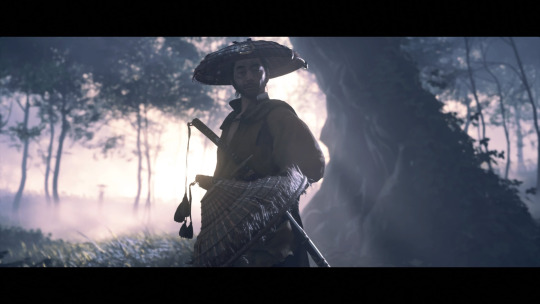
From a discouraging defeat, Jin, however, vows to avenge his fallen samurai brethren and rescue his uncle from the clutches of the evil Mongol invaders. Here, too, was when my journey to collect everything and complete all the side stories began.
Unfamiliar with the works of Kurosawa Akira, I can not rightly say if the narrative nestled in Ghost of Tsushima’s maze of collectibles plays upon the tropes of those that came before. What I did manage to glean was a story of revenge and hate, the cost of war and the values embodied by the notion of ‘samurai.’ With his back to the wall, Jin Sakai must adapt if he hopes to win. Much like Yuna’s speech at the start of the game, he and Lord Shimura have forgotten what it was like to face someone stronger and smarter than they were. If Tsushima and its people hoped to survive, instead of throwing away their lives, they needed to change their tactics.
In the early stages, Jin is shown to grapple with the idea of going in quietly and silently stabbing people in the back. But after the first mission and the first outpost, he was free of the burdens that were his old code of honour. I suppose in that sense, there is a degree of dissonance between the narrative and the play. Alas, I couldn’t have cared less as I went from camp to camp, observing the leaders and unlocking new technique points.
The end of Act 2 and the beginning of Act 3, however, is when Jin Sakai’s actions finally catch up to him. Instead of following through with his uncle’s plan of rebuilding the bridge at Castle Shimura after an explosion killed countless soldiers and allies, he poisons the Mongols drink in a bid to save the lives of his comrades. Classic war crime manoeuvre. Learning from this, however, the Mongols use this against the people of Tsushima as well.
It is this devastation that we see after Jin escapes from his uncle’s stronghold, desperate to free the people from the Mongol’s iron grip. Despite the gruesome nature of it all, it helped put Jin’s actions into a different light. By making the enemy aware of a new weapon, could he have possibly doomed his own people?
Subsequently, when the Khan is killed and Jin is about to face his father figure, it makes sense for Shimura to point out many of his misdeeds. Can the people of Tsushima really be saved if Jin’s actions undermine the authority of those in power? What of the stories that paint him as a ten foot demon with eyes that glow in the dark?
So, it came as no surprise when Lord Shimura asked for a warrior’s death. And wishing to be the dutiful son, no matter how painful it would be, I granted it. One last ‘honourable’ act.

The gameplay in Ghost of Tsushima initially proved to be a challenge, although that was mostly due to the fact that I had to readjust my understanding of my controls. Navigating without a minimap in the corner or a HUD showing me the general directions of north, south, east and west also took some time to adjust to. I don’t think I’ve ever just ‘followed the wind’ when it came to video games before. But, because of that, it allowed me to actually keep my eyes focused on the screen in front of me rather than the top right/ left corner. I could actually take in the scenery instead of being solely focused on clearing out the fog of war.
As for the actual combat, the controls were incredibly intuitive. Square for a normal attack, triangle for heavy. L1 to block and circle to dodge. Where it seemed like the developers should have stopped a little when it came to the variety of options available to the player was mapping R2 as the interactions button - but also the stance and quick throw wheel.
Traversal also proved to be fun and because the HUD wasn’t as cluttered as I was used to, it made exploration easy. Equipped with the Traveler’s Outfit as soon as the game had started also made it incredibly easy to start hunting down collectibles and feeding my urge to see every nook and cranny that was on display. What pained me, however, was the fact that it took me a while to realise that I needed to progress the story and obtain the grappling hook before I could complete a few of the shrines in the first area. And to obtain a few choice head gear.
My only other gripe with the game is that my poor Nobu was felled so swiftly at the start of the third act. And the thin brown horse that served as its replacement was not the replacement I had hoped for. Thankfully, Yuna was able to gift me with another horse - which I named Sora - but my heart still goes out to the faithful Nobu.
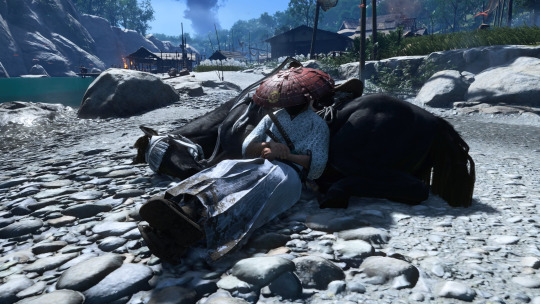
Why do you have to kill all of my faithful steeds, video games? I was distraught when Red Dead Redemption 2 did it. Appalled when Shimmer was caught in an explosion in The Last of Us Part II and now...this?
The side characters and side stories also proved to be entertaining distractions over the course of the long journey to free Tsushima. While Masako’s revenge plot was a hollow echo of the pain Jin faced, it was Norio’s burning of the Mongol camp that left me frightened of the legacy of the ghost. At least the ending of Sensei Ishikawa’s story felt a little more redemptive and filled wit hope.
And, after IMDBing the cast, I was gladdened by the fact that many of the voice actors chosen for the game were Asian Americans. Jin Sakai was actually voiced by a Japanese man in the English dub! Imagine that!
Ghost of Tsushima is an excellent open-world game that hews quite closely to the more recent Assassin’s Creed formula. Despite that, I thoroughly enjoyed my time exploring Feudal Japan, inconsistencies and all! My favourite part of it was collecting Mongol artefacts, records and learning a little about each clan banner. The combat also provided a few surprises, although the duels were a little tedious in the latter half. With the world still unable to quite shake the virus that still threatens many of our loved ones, it’s fun to actually dive into this fantastical and historical inaccurate world that is Ghost of Tsushima.



14 notes
·
View notes
Text
COHEN, LEONARD
So, here’s the thing: I don’t know anything about Leonard Cohen.
I do own two of his most acclaimed albums, but don’t get too excited. I bought both of them the week of Cohen’s passing solely because learning of his passing made me realize I didn’t have anything by him in my collection, and he’s always been on my radar as an artist I should probably know some things about, you know? I listened to those two discs one day while I was cleaning my apartment or something, and they were lovely and pleasant and sounded great, but then I filed them away on my shelf and that was essentially the extent of my immersion into the world of Leonard Cohen. I know the reissues I purchased are noteworthy entries in his discography, because they’re housed in these rather attractive hardcover digipacks with booklets that feature lengthy contextual essays written by people way smarter than me. I suppose I could read those essays and glean a little information about Cohen that way, but then I’d just be offering you disingenuous regurgitation, and I don’t want to fake anything in these pages; that’s kind of counteractive to the entire purpose of me writing these dumb things. So if you want to read a thoughtful essay about Leonard Cohen constructed by someone who I assume knows enough about Leonard Cohen to warrant being paid to write an essay about him, you should definitely seek out the striking deluxe editions of Songs From a Room and Songs of Love and Hate I’m referring to, because both have essays in them, and they’re printed on glossy paper so they’re probably pretty good (very few crappy essays get preserved on glossy paper).
No one is paying me to write this essay about Leonard Cohen—they’d be pretty stupid to do so, since I don’t know anything about Leonard Cohen—but I have that pair of records and he’s the next artist on alphabetical deck. So here we are.
Actually, you know what? Before we get started, I’m going to go ahead and advise you to just skip this piece altogether.
Hear me out. I can’t imagine this is going to be one of my better entries; considering my not knowing anything about the person I’m supposed to be writing about and all, the odds of my somehow summoning literary gold here aren’t particularly strong. Also, Leonard Cohen is a highly respected artist, and based on the listening I’m doing right now, he definitely deserves that respect—I’m on my second spin of Songs from a Room and it is an absolutely beautiful record. But what am I accomplishing by telling you that? You probably already know Songs From a Room is an absolutely beautiful record, and if you don’t, you should totally listen to it right this minute instead of reading anything I might observe about it, because the album is a whole lot better than this essay is going to be. I’ve been down this road before, so I can tell you exactly what’s about to happen here: I’m going to keep prattling on with gibberish just like this and end up embarrassing myself by blowing yet another chance to write something substantial about a substantial artist. I guess I could comment on how much I like the two Cohen songs that were used to bookend the mindfuck of a film Natural Born Killers or something, but what purpose will that serve? There, I commented on it, and biting into those ‘member berries hasn’t magically ignited some spirited dissertation, has it? Look, I’m saying this because I care: I really think you should call it quits on this piece right here and now, before you get in too deep. I’m already doomed, but it’s not too late to save yourself. Run, go, get to the choppah. Fly away, Clarice, fly fly fly. ‘Member?
Okay, you’ve been duly warned. So if you do decide to continue on, I’m not going to feel terribly bad about wasting your time, especially since I essentially just promised you anything I write from this point forward is going to be a waste of your time. I mean, everything I’ve written so far has also been a waste of your time, but I haven’t written that much yet. And at least the stuff I wrote so far has served a purpose: it cautioned you that everything to come is going to be an even bigger waste of your time. I can’t promise any of the supplemental paragraphs I’m about to compose will be worth even that much, so I really have to advise you to take a moment here and consider your situation carefully. Weighing everything I’ve just told you about my not knowing anything about Leonard Cohen (and, just to be clear, I’m not playfully minimizing that disposition; I honestly don’t know shit about him), along with my stated unambiguous surety that I am about to waste an indefinite amount of your time (you must be familiar with my work by now; it’s totally plausible this thing could end up running 15 pages)—do you really want to read any of more of this? It’s still not too late to back out. Your time investment thus far is minimal. You can just move right along to the next piece (it’s about Coldplay, so I’m sure that essay is going to be way funnier than this one). My feelings won’t be hurt, I promise. I can hardly fault you for not reading this, because there isn’t any reason at all you should read this. Unless you just really enjoy reading these entries in general, but that seems highly unlikely because nobody enjoys reading them—shit, I only enjoy every fifth one or so, and I write the fucking things.
Check it out: usually by this point in a composition, I would be painstakingly rereading what I’ve written so far to make sure I’m off to an okay start, right? But I haven’t done that in this case because I already know everything I’ve written so far is garbage. This piece isn’t going to improve, either. And that’s what I’m really trying to get across to you here: I am woefully ill-equipped to write anything about Leonard Cohen that is as excellent as his music—I just listened to Songs of Love and Hate a couple times, and holy shit, that’s an absolutely beautiful record too. You may assume I’m continuing this obnoxious diatribe because I’m setting you up for some grand gag (granted, it’s a fair guess, because I’ve done that a few times in entries past). But I’m not joking when I say that I’m not joking in this instance. This rambling philological self-fellation is not going to coalesce into something worthwhile; it’s just going to go on and on like this until I decide I’m done fucking with you and then this essay will just sort of… end, without preamble or satisfaction. I’m telling you, if you keep reading this, you are going to be super pissed off when you finish it. You’ll get to the conclusion, and you’ll grumble, “That’s it…? That was stupid.” And you will be right, because that will be it and it will be stupid.
Since that will be transpiring soon, we should probably clarify that at this point, when it does it’s going to be entirely your fault. If you go all the way back to the beginning of this twaddle, you’ll clearly see the very first thing I wrote was, “So, here’s the thing: I don’t know anything about Leonard Cohen.” That was the opening fucking sentence, dude. Seriously, what did you think was going to happen after that? And only a few lines later, I wrote: “I’m going to go ahead and advise you to just skip this piece altogether.” Then came that whole part about how reading this was going to be a total waste of your time, blah blah blah. You can check if you want; it’s all totally in there. I’m sure you didn’t think I’d be reprinting complete sentences you already read—and, you know what, yes, that’s kind of a low blow, I’m realizing now—but after I took the time to explain in detail that this essay would likely end up serving no purpose whatsoever, surely that must have given you pause. I mean, didn’t you think to yourself, “Wait a minute, before I read this essay, is it going to serve some purpose?” As I’ve made abundantly clear, the answer is: No. No, it is not. I was pretty up front about that. In fact, I specifically told you not to read it—“there isn’t any reason at all you should read this”; is that ringing a bell at all? So if you are still reading it, that’s kind of on you, dude. Sure, I could have stopped writing a long time ago and spared you from all of this bullshit, but let’s not get caught up in semantics.
Have you seen the movie Reservoir Dogs? I’m assuming you have, but if you haven’t, you can add that to the list of far more fulfilling things you could be doing right now instead of reading this essay. Anyway, the film is centered around the aftermath of a jewelry store robbery gone horrifically wrong. We don’t actually see the caper take place, but the characters reference it enough along the way for us to get a clear sense of things devolving into a bloodbath after one of the robbers, Mr. Blonde (played by Michael Madsen) shoots numerous people inside the establishment. Is it coming back to you now? Good. There’s a reason I’m bringing this up.
Since Madsen is absent for a lot of the movie, the audience’s understanding of the storyline relies mostly on what the characters played by Steve Buscemi and Harvey Keitel share with us about what has occurred. Their perspective is clear: Mr. Blonde went crazy and started killing people, and that’s why the whole heist went tits up. However, when Madsen finally appears at the warehouse where the bulk of the plot’s action takes place, he presents an entirely different assessment of the exact same incident. It is here that the movie shifts into the subtle employment of a narrative device known as the “Rashomon Effect,” so-named because this formula’s introduction to Western film-goers is commonly credited to the 1950 Akira Kurosawa film Rashomon—a picture which we can assume in hindsight Reservoir Dogs creator Quentin Tarantino was consciously invoking since his filmography has since revealed a heart-on-sleeve fandom for the work of that storied Japanese director (several Tarantino flicks make reference to this allegiance, but his Kill Bill films in particular are at their core unashamed modern reimaginings of Kurosawa’s legendary Samurai epics). I won’t recount the entire plot of Rashomon, since doing so would be superfluous here (as opposed to all of this shit I’m writing about Reservoir Dogs, which is obviously vitally important to this essay about Leonard Cohen). All you really need to know for our purposes is that the crux of the story is a singular event which is assigned completely disparate interpretations by the various people in the film who witness it. Which is precisely what happens when Michael Madsen makes his entrance.
Now, I’ve seen Reservoir Dogs many times, but not enough times to have the dialogue faithfully memorized; you’ll have to forgive me if I paraphrase a bit here. Essentially, Keitel’s character calls Mr. Blonde a “maniac” or something to that effect, a designation based on Madsen’s character opening fire upon one of the store’s clerks for what Keitel perceives as “no reason at all.” Madsen’s response to this slanted accusation is fascinating. In direct repudiation of his labelling as a “maniac” seconds before, he continues calmly drinking his soda as he amends Keitel’s analysis of the murder by providing a remarkably lucid and utilitarian explanation for the killing: “I told her not to press the alarm, but she did. If she hadn’t done the thing that I told her not to do, then I wouldn’t have shot her.”
It seems we are sharing our own Rashomon moment, my friends. You may feel like your time has been wasted, and it certainly has. But I am not the one who wasted it. That was you. I told you not to read this essay, but you did. If you hadn’t done the thing I told you not to do…
Mr. Cohen: I am truly sorry. Your music is stunning, and you deserve far better than this.
As for the rest of you: I mean, dude, I fucking told you.
March 31, 2019
2 notes
·
View notes
Text
Why Eremika is amazing (part 2.)
Hello ! I promised a long time ago to make a following of this eremika post , so I apologize for time it took but it’s finally here ~ (however don’t expect to a lot of thing since the essential has already been said in the beginning, actually).
3. An universal POV on love, beauty beyond cruelty

The "Cruel and beautiful" Mikasa’s maxim is at the epicenter of SnK. As many metaposters have already presented that, I wouldn’t go back in length on why it is (but just recall the fact that it’s important the most “universal” axiom of SnK is being done through eremika’s prism). Imo, this principle is to link with another idea that has circulated throughout the story : does life in a cruel world has a meaning ?
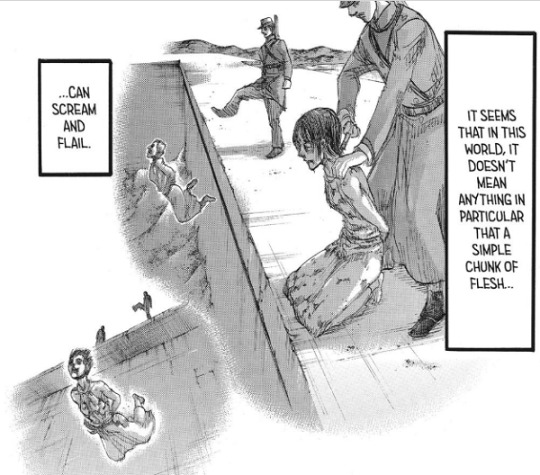
This part of the world, the one with hazardous deaths and merciless of titans / enemies, does represent the cruel side. The cruelty is to be found in the absurd and the chance, the fact that some survive (the case of Floch in particular after the attack carried out by Erwin) and others die, without there being no justification to give of it.

But what is the beautiful side of such a world, to which Mikasa’s referring when she’s thinking of Eren ?
Well, again it's quite sparse / interpretative (that's also why this post is a struggle to write), but this answer has a relation with the fact that narratively, the connection between eremika and the world is strong.
This is carried firstly by the place of main character of Eren and especially the fact that each of his actions has a major impact on the whole world currently but also because the relation eremika is surrounded by reflections, and by plot relevance around the world.
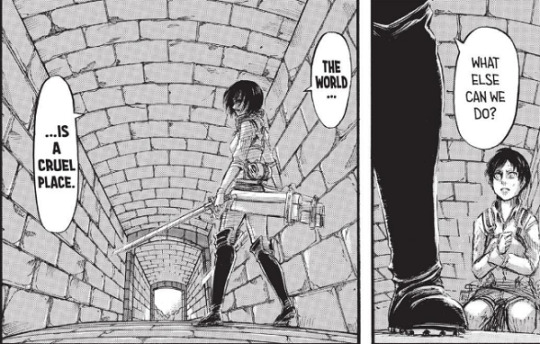
The reason I'm led to think that is the Eren and Mikasa’s moment at chapter 50 which may prefigure many things, and which are still accurate imo, especially with the coordinate. The first time Eren was able to activate coordinate was because of his desire to protect his loved ones, and especially at that moment, Mikasa. This is also highlighted by Eren’s memory who opens the chapter :

To go back on the said moment, it's interesting to observe a small detail in the animation, but which got its importance, that when Eren is feeling that his power doesn’t have any meaning since he still not able to save his parental figure (his mother, then Hannes) and realizes they're doomed, the brightness of the environment gradually decreases as if to suggest the world’s darkness, its cruelty in short.

Then Mikasa reminds him of the second facet of her maxim, through the memory of the scarf moment : “Thank you for being with me, for teaching me how to live, for wrapping this scarf around me.” It's also interesting to note that the perspective is essentially centered on Eren at that time, both on the side of the darkening world and the discussion with Mikasa since even the memory of the scarf that she evokes is drawn from his point of view:

Anyway, what I wanted to say is that this moment is especially important because of the embodiment of human natural sympathy it makes. Yes the world is cruel, there is non-sense and absurdity behind everything for which men struggle (Eren struggled to control a powerful force, to be worthy of representing humanity’s hope and it’s meaningless because Hannes still died and still they’re all doomed). But the natural sympathy that there is between men which is able to make a boy gives his home to a girl he doesn’t know for none other reason than this sympathy, is something beautiful and meaningful enough. So the beauty correspond at the meaning one can give to life, in the sense of a connection with humans and humanity itself. It’s the connection within humans as something warming
Like Mikasa’s maxim (”cruel but very beautiful”), though cruelty is present at first, the beauty of the world ends up prevailing over it since the environment after this memory, is illuminating again :
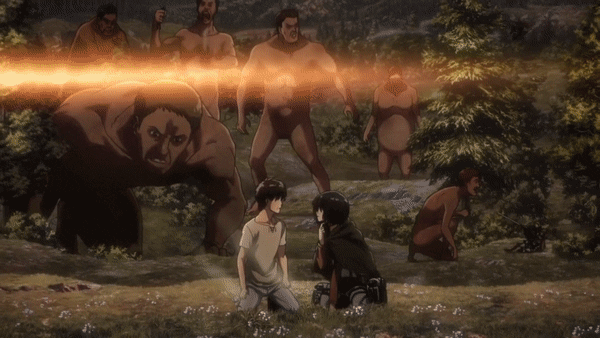
What makes this relationship universal is also that, narratively, the fact that Eren and Mikasa manage to share this moment literally saves everyone (Eren manages to engage the coordinate and they can all leave) (we can also notice in the animation above, that through this light increasing / decreasing we're going from a focus on eremika to a focus that illuminates the rest of the environment).
The theme of beauty also joins the theme of humanity in this sense. To resume on Arendt on which I had finished the last meta, the definition of humanity is the recognition in a community of living, that is to say the feeling of belonging trough this community, to the world, among similar persons. And in this imo, eremika represents all forms of love in SnK.
There was a meta about love as a lifeline a few months ago (but unfortunately I can’t find it again, if it recalls something to anyone don’t hesitate to tell it !), which was particularly accurate with this. Love, in its particular form, provides access to a universal form of love, and is the only way that can truly reverse the course of events and the cycle of hatred / enemy / resentment / war etc.
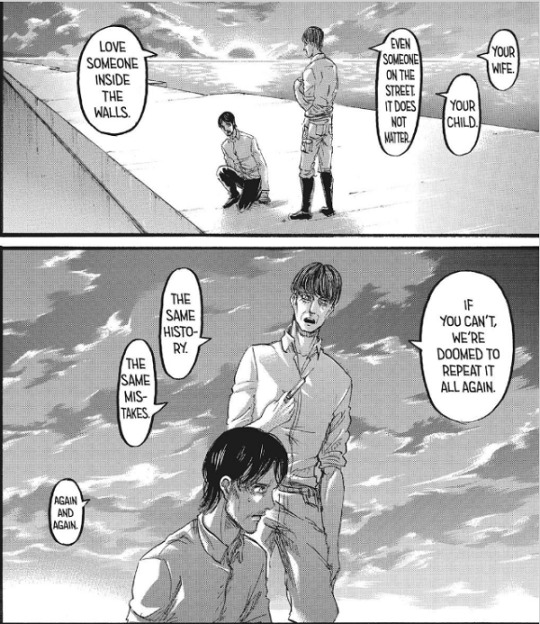
As a matter of fact, currently in manga’s action, things are at a reverse stage at this level. Mikasa and Eren have both given up the warmth of the scarf symbol and failed to communicate, coming up on a quiproquo (Eren believe Mikasa don’t see him more as a family debt, and Mikasa believe Eren had always hated her). And as a fact even though actions are supposed to go in the sense of saving loved ones, results aren’t very positive: chapter 50 -> everyone is saved ; chapter 124 -> the rest of the world in exchange of four people lives.


Well I’m not saying either eremika is a holy grail and at the very moment they’ll finally truly communicate on their love, entire world and SC and titans and Ymir will be saved, it would be way too sweet. But I do think a moment of exchange with their parallel (Mikasa and Falco especially) and the coming back of scarf moment may have an impact on the closure of the issue with world’s annihilation currently.
Well, this meta was pretty far-fetched and not very “limpid”, I probably wouldn’t have published if it wasn’t for the so kind people who asked it, so here it is ! I just hope it’s not too much disappointing compared to the delay you’ve wait for it ahah, and in any case, thank you very much for all the sweet words and encouragement ~
#shingeki no kyojin#snk#attack on titan#AoT#shingeki no kyojin meta#snk meta#attack on titan meta#aot meta#shingeki no kyojin analysis#SNK analysis#attack on titan analysis#AoT Analysis#eren#Eren Jaeger#eren yeager#Mikasa#Mikasa Ackerman#eremika
77 notes
·
View notes
Photo
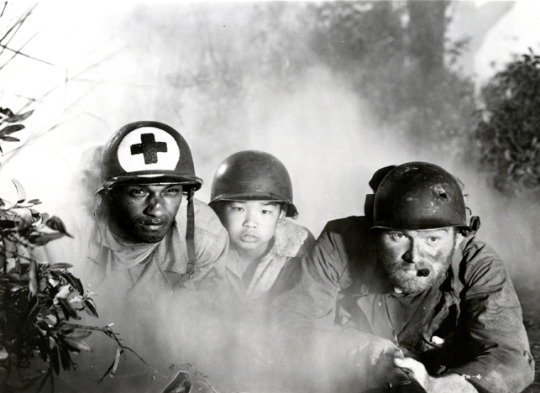
The Steel Helmet (1951)
Looking through American World War II films made during the war itself, one notices that many have overt strains of bellicose patriotism and propaganda. That war, the final world-consuming crisis for several decades, impacted even civilians living oceans away from the violence. The Korean War cannot be described as such. When North Korea’s Kim Il-sung ordered the invasion of South Korea on June 25, 1950, the U.S. military that countered the invasion was a shadow of what it was five years earlier. What was originally described as a “police action” and nominally pitted United Nations forces (of which the U.S. provided ninety percent of troops) against Communist troops failed to garner much attention from the American public even as it was being fought.
Released a half-year after North Korea’s invasion, The Steel Helmet is one of the first films set during the Korean War. Directed, produced, and written by Samuel Fuller for the independent studio Lippert Pictures, the film was made on the cheap ($104,000; just over $1 million in 2020’s USD) and shot in ten days. The Steel Helmet bears little resemblance to its older cinematic cousins, the WWII films released during that war. Convulsing with bitterness, racism, and post-traumatic fury, this is an attempt to portray life as an American infantry soldier with emotional honesty. The details of battle scenes might not be as accurate as they could be – and certainly not how Korea itself and the film’s Asian characters are portrayed – but The Steel Helmet succeeds in its primary goal.
Surviving a North Korean massacre, Sergeant Zack (Gene Evans) is found by a South Korean boy he will nickname “Short Round” (William Chun; this nickname, also used in 1984’s Indiana Jones and the Temple of Doom for Jonathan Ke Quan’s character, refers to a flaw in a gun’s ammunition). Short Round knows English and begins following Zack – much to the latter’s annoyance. The boy won’t listen to, “beat it, kid”; nor does he appreciate being called a, “gook”. Zack and Short Round soon encounter Corporal Thompson (James Edwards), a black medic who is the last surviving member of his unit. The accidental trio shortly stumble onto a small, battered patrol commanded by Lieutenant Driscoll (Steve Brodie), who immediately suspects Thompson – because of his race – to be a deserter. Just as the trio argue with Driscoll and his unit, the soldiers are ambushed by snipers and take cover in an abandoned Buddhist temple (to the film’s discredit, it resembles nothing like an actual Buddhist temple and the centerpiece statue looks nothing like the Buddha). There is a North Korean soldier hiding in the shadows of the temple. And unbeknownst to the American soldiers, an enormous wave of North Korean soldiers is advancing on their position.
The events and characters of The Steel Helmet are fictional, but they have been adapted from Fuller’s war diaries and adjusted for the difference in setting. The Steel Helmet’s limited budget ensures that the violence is contained to the premises of a soundstage; the hordes of North Korean soldiers appearing in the film’s finale either the product of stock footage or Asian college students from UCLA hired as extras. There are no soldiers in The Steel Helmet who show complete deference to authority or accept the reasons why the United States military is in Korea at all. The encompassing political reasons for the Korean War are of little concern to them – survival becomes their only motivation. As a portrait of an infantry soldier’s mentality in desperate circumstances, The Steel Helmet benefits from Fuller’s military service during World War II. The soldiers’ actions and mindsets always seem realistic.
With his scruffy beard and punctured helmet, Zack is a grunt soldier that has become disillusioned with a war that has not even lasted a year. The anger he feels about the adversity he and his comrades have faced is boiling over. Zack is constantly searching for something or someone to take his emotions out on. His somewhat contemptuous attitude towards Short Round suggests racial resentment (more on the film’s depiction of racism later in this review) and that he has no patience for those who cannot defend themselves when the enemy is near; his initial behavior towards Driscoll’s squad is colored by grief manifesting as antagonism.
Fuller’s attempts to articulate the deranged psychology of battle-hardened infantry soldiers are taken to extremes rarely seen in American films in the 1950s. The most chilling example occurs as the film’s closing act begins. A prisoner of war (POW) is unexpectedly murdered by Zack as North Korean soldiers draw near. Zack carries out this murder with concealed, stone-faced passion. Even without the gruesome images that are allowed in modern cinema, the murder is shocking and, considering the characterizations of those involved, conceivable. It is lawless battlefield “justice” where the executioner is also the judge and jury. For moviegoers accustomed to the mostly propagandistic – intentional or otherwise – World War II films released in the prior decade, the notion that a member of the United States military could commit a war crime must have been unconscionable. Then and now, other American viewers not nearly as critical of the military’s conduct might have seen what is an obvious violation of the Geneva Convention as justified.
Joseph Breen’s office at the Motion Picture Association of America (MPAA) was tasked with enforcing the Hays Code (censorship guidelines that applied to American films until 1968, when replaced by the present-day ratings system). As one might expect, the Breen Office voiced vehement objections to this scene – especially since Zack is never punished on-screen for his actions. Nevertheless, Fuller campaigned to keep the scene and it remains in the film. The Breen Office’s reasons for backing down on this appear to stem from the fact that Driscoll threatens a court martial immediately after Zack fires his gun – a peculiarly minor concession, it seems. The Breen Office’s ultimate approval of the film’s debate on racial relations are unclear, and I have been unable to find any explicit reason in freely available literature describing that aspect.
The film’s prisoner of war (played by Harold Fong, whose character is credited as “The Red”) is an English-proficient North Korean soldier. Observing the unit that has captured him, the audience will notice that this is a motley bunch. Granted, the notion of a diverse military squad is a war film cliché. But after President Harry Truman desegregated the armed forces in 1948, note that this is one of the first depictions of an integrated U.S. military in film. A decade earlier, Cpl. Thompson would have been bandaging the wounds of black soldiers and might not be allowed near a wounded white comrade. One of Driscoll’s subordinates is Sergeant Tanaka (Richard Loo; a Chinese-American actor who nevertheless made a living playing numerous Japanese antagonists during the 1940s), who served in the 442nd Infantry Regiment – which was composed almost entirely of second-generation Japanese-American (Nisei) soldiers – during WWII.
Under watch by the Americans, the North Korean soldier will attempt to stoke racial divisions among his captors. Speaking to Thompson, he notes the hypocrisy of a black man fighting for a nation that has failed to recognize non-white people as equal under the law. The prisoner notes that, if Thompson ever returns home, there will still be “whites only” services and that he will have to sit in the back of public buses. Thompson keeps his cool, acknowledging the reality of the prisoner’s words. Nevertheless, Thompson reasons, he is assisting the nation he cares for, showing that he can perform as ably as anyone regardless of race. As Thompson implies, perhaps one day the United States will achieve the ideal it is purported to be – in his individual way, he shall serve the best he can.
Then there is the nighttime conversation between the North Korean and Tanaka. The POW begins by remarking that Americans despise Asian eyes, and then – in what is possibly the earliest, non-documentary mention of this in American cinema – evokes the Japanese-American concentration camps that Tanaka and his family almost certainly were forced into. An exhausted Tanaka, with a fatigued but barely annoyed glance, tells the North Korean major that his charade is too transparent:
THE RED: …They call you “dirty Jap rats” and yet you fight for them. Why? TANAKA: I’ve got some hot infantry news for you. I’m not a dirty Jap rat. I’m an American, and if we get pushed around back home… well, that’s our business… knock off before I forget the Articles of War and slap those rabbit teeth of yours out one at a time.
If The Steel Helmet had been made a few years, perhaps a few months, earlier, these disapproving mentions about the United States’ terrible record on racial equality might never have appeared in the film. The legitimate concern that black Americans would not support the United States military resulted in films like The Negro Soldier (1944). In World War II, the then-segregated military was viewed unfavorably by a substantial minority of African-Americans, so the government (and a cooperating American film industry) reasoned that directly addressing the nation’s painful racial history might be counterproductive. And so soon after World War II’s end, the “yellow peril” that was the Japanese was substituted for another anxiety: communists. Still, the prevailing attitude among American narrative media in the early 1950s was to celebrate the “patriotic” Japanese-Americans and those who served in the 442nd – erasing almost entirely the unconstitutional and inexcusable internment of Japanese-Americans.
As Fuller realizes as he dons his Cold War glasses, the likes of North Korea, the Soviet Union, and the People’s Republic of China could easily use the United States’ racism to undermine its message. Those nations did exactly that and continue to do so (the Soviet Union succeeded by the Russian Federation). America’s idealized self-perception as democracy’s champion collapses quickly even at a cursory glance of its racial relations. The Steel Helmet should be applauded for including this dialogue in the film, but these scenes are brief and never fully adopt Thompson or Tanaka’s point of view. Both are portrayed as intelligent, composed soldiers. But beyond their soldiering, we learn little else – The Steel Helmet is Zack’s movie, with everyone else not nearly as developed as Gene Evans’ central character.
Fuller avoids glamorizing military service and war. Despite Korea as his setting, Fuller makes little constructive use of it and his Korean characters. Fuller might have found his own wartime mentality analogous to Zack’s, but the film becomes one-dimensional as it cannot branch out to detail the other American soldiers’ personal responses to the war they are fighting. The Steel Helmet is homiletic, so be warned if you are not seeking a war film that is unafraid to moralize – sometimes without artistry. But given the restricted budget and the film’s abbreviated 85-minute runtime, I found myself forgiving the film for most of these flaws.
Communist and far-left commentators accused The Steel Helmet of being pro-American propaganda; the far-right, Breen Office, and the Pentagon were horrified by the film and blasted it as anti-American. J. Edgar Hoover, the Director of the Federal Bureau of Investigation (FBI), even launched an investigation into Fuller for suspected Communist sympathies. Such reception must have allowed Fuller a strange satisfaction, if one accounts his future reputation for addressing controversial themes with heavy-handed metaphors and allegories.
Moderately popular when first released, The Steel Helmet languished in obscurity in the decades after. That is unsurprising – the film was made and distributed by an independent studio. Thanks to the Criterion Collection and their special relationship with Turner Classic Movies (TCM), The Steel Helmet has found renewed attention thanks to its home media availability and the occasional TCM broadcast (it is regularly scheduled around Memorial Day and/or Veterans Day, in addition to the odd showing outside May and November). It is a fascinating addition to the lengthy list of American war films, supplying an era known for its propaganda-heavy elements with a forceful rebuke.
My rating: 7.5/10
^ Based on my personal imdb rating. Half-points are always rounded down. My interpretation of that ratings system can be found in the “Ratings system” page on my blog (as of July 1, 2020, tumblr is not permitting certain posts with links to appear on tag pages, so I cannot provide the URL).
For more of my reviews tagged “My Movie Odyssey”, check out the tag of the same name on my blog.
#The Steel Helmet#Samuel Fuller#Gene Evans#Robert Hutton#James Edwards#Steve Brodie#Richard Loo#Sid Melton#William Chun#TCM#My Movie Odyssey
4 notes
·
View notes
Text
World on Fire, Episode 5: Us-Versus-Them
Late May 1940—Early June 1940
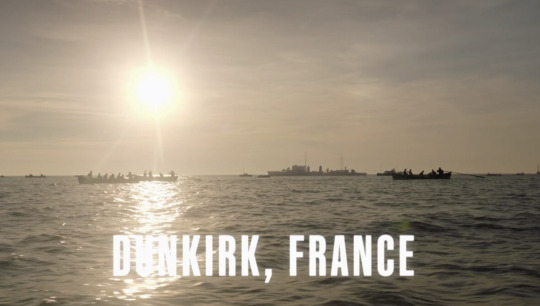
Harry’s BEF unit has dwindled down to four exhausted men straggling through the fog. Belgium has fallen to the German invasion. Refugees and soldiers line the roads all the way to the horizon as hundreds, if not thousands, walk to the coast. Stuka screamers swoop down over them in a practice called strafing.
Harry’s unit picks up a lost French girl and her dog and later finds a group of shell-shocked soldiers and two Senegalese soldiers separated from their unit in Ypres. (Yes! Something that includes the colonial forces!) Stan is suspicious that some of the men could be faking their symptoms to hide that they’re German spies or British deserters, but Harry refuses to leave the men behind as the group makes a long and perilous journey to the coast.
Along the way, they stop at a field hospital in hopes that the shell-shocked soldiers could be treated, but the head doctor says the hospital is full to capacity and cannot take everyone. The doctor in question? None other than Webster O’Conner! The interactions between the Parisian characters and the soldiers are brief, but it’s always a delight when characters from different storylines converge.
So, exhausted and still covered in blood from the attack on the road, the soldiers set out again with only a vague order of retreat and a possibly false map on a propaganda flyer to guide them. The German line is pushing in, and anyone left behind will be taken prisoner...from the French soldiers guarding the perimeter to the wounded in the field hospital.
Uwe receives the first letter from the Institute. He yells at his workers for displaying Nazi flags (because they could get “caught in the machines”) and draws the attention of an employee who is a proud member of the Nazi party. He tells Claudia (still at the lake house with Hilde) of the news, and the two resolve to be strong for their daughter, no matter what happens or how they disagree.
Later, the Nazi employee reveals that she knows about Hilde and her hiding place. Enraged, Uwe reacts like I’m sure many parents would want to if their child is threatened. He follows the employee into the factory and strikes her face with an iron. Between the blow of the iron, her fall onto a table, and her final descent to the concrete floor, the employee dies of head trauma.
Now with an even more urgent problem, Uwe turns to Nancy for help, and it turns out Nancy has had some experience with carrying a corpse in the past. Like the backstory of Harry’s father, Nancy’s history is still kept under wraps. Did she report on the Spanish Civil War? Something in America? Maybe the next two episodes will involve an explanation.
Douglas and Robina continue to meet and see Jan. Robina starts to look at Douglas with something more than pleasantness as he bonds with Jan.
(Again, I ask, if their kids are broken up for good, can they get together?)
But this enemies-to-friends-to-they’d-never-admit-to-wanting-to-be-lovers relationship still has its hurdles, particularly how they don’t see eye-to-eye about the war. Then there’s Robina’s lingering prejudices.
ROBINA: I can’t make out if [Jan’s] dourness is a racial characteristic or his personal disposition.
DOUGLAS: I’m not sure the Poles are a race.
ROBINA: Well, they aren’t like us, are they?
(Oh, there’s an us now?)
Across the Channel, Lois is now visibly pregnant and is treated differently for it, something underscored by her conversation with her manager, who suggests that she stand still while performing.
LOIS: Are you saying I wobble, Ted?
A pilot tries to make conversation with her and Connie (suspicion is drawn to his “Canadian” accent) but is rebuffed. Lois makes a wonderful stink face.
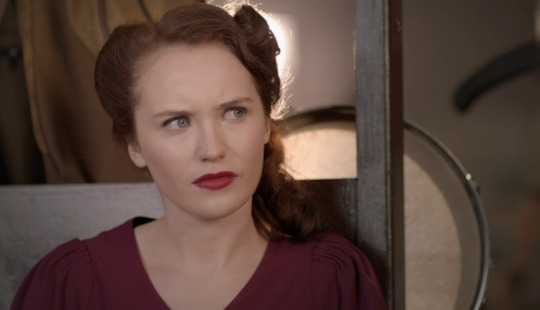
Gotta wonder if Stan’s fear of spies is foreshadowing for that guy being a spy.
She later speaks with a pilot, Vernon Hunter, who is immediately drawn to her. He would be part of the RAF’s support of the evacuation, but his “kite” (plane) was damaged and needs repair. The two have tea and meet a few times over the next days.
VERNON: I meet a lot of men who think they’re strong, Lois, but I know strength when I see it. And you have it in abundance.
Polite and observant? A pilot and a gentleman? It’s like Vernon walked out of an old movie—complete with tilted cap and proper accent.
Before he leads his men out and her ENSA troop moves on to their next show, Vernon asks Lois if he can write to her. She gives him her address on an envelope originally from Harry, but she keeps the old letter. She’s starting to let go of Harry, but not entirely. Not yet.
(Let him go, Lois! You’re always so sad when you’re in a scene with him. Be with someone who makes you smile and reminds you that you’re already strong!)
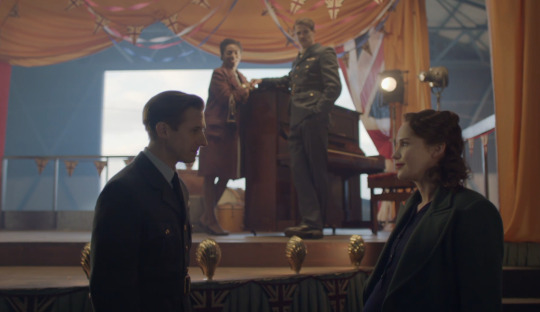
He looks at her like she hung the moon. It’s great. (Possible spy is by the piano).
Tom is one of the sailors delivering soldiers across the English channel.
TOM: How come our ship is called HMS Keith? Keith isn’t the name you give to a fighting ship. All the other ships are called Atlantic, Calcutta, Dreadnought. And we get Keith.
His bitter monologue about the un-inspiring name of the HMS Keith is ironic for a couple of reasons:
1. Because apparently his experiences on the Exeter weren’t enough for him
2. Because the HMS Keith would be sunk on June 1st, so in a bleak sense of luck, Tom could switch ships then.
3. Because once again, Tom is taking part in a historic event and doesn’t treat it as such.
4. Because characters eventually do get on lifeboats for a ship that captures Tom’s imagination, the Calcutta.
After months and months of walking, Grzegorz finally reaches the coast.* But Tom, having no knowledge whatsoever of Grzegorz’s background or the long and horrible journey he has had, refuses him room on the lifeboat because he skipped the queue and German planes are likely to return any minute. The confrontation only escalates from there. Tom points his gun at Grzegorz, who desperately challenges him with “I am not afraid of death.” A soldier pushes Grzegorz into the water with a dismissive, “Go fight for your own country!”
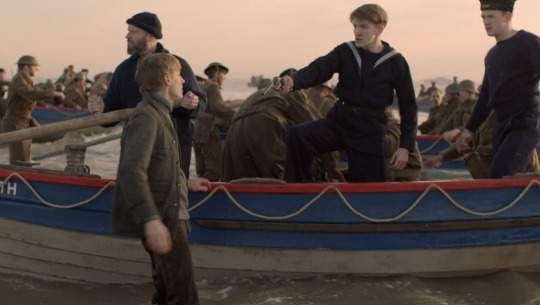
This is one of several scenes that highlight how people can sometimes draw behind national, ethnic, and racial divisions in times of stress, and how others can choose to cross these boundaries. Along with reminding the viewers of the less heroic sides of Dunkirk (there is more than one account of someone trying to get to a boat shot by a person in that boat), it also brings out the differences between Tom, Grzegorz, and Harry.
In a later scene, a soldier starts a fight with Harry’s unit over the Senegalese soldiers because they are part of the French colonial forces (and thus, to him, France’s responsibility to evacuate). Instead of leaving Demba and Ibrahim on the beach, Harry fires his gun into the air and commands that the Senegalese men remain with the group.
But beneath all their dramatic declarations is the fact that all three of them want to live. So when German planes fly over the beach and begin to strafe and bomb the men in the lifeboats and on the beach, everyone runs for cover. Higher up on the beach, Grzegorz is able to duck behind a crate. Tom is without shelter and collapses. It is unclear if he is still living.
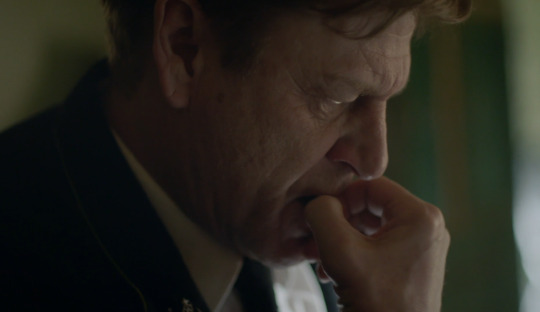
Across the English Channel, Douglas senses something is terribly wrong. Already anxious over news of the evacuation (which would have become public knowledge on May 31st, as far as I’ve read), he rushes to Robina’s to see if, as the mother of an officer, she knows more about Harry’s survival, and possibly Tom’s. Concerned with Douglas’s emotional state, Robina refuses him entry in the house.
One thing that caught my attention when I rewatched this episode was how, up until this point, Douglas has generally made certain to call his children “my Tom” and “my Lois” and Robina’s son “your Tom.” In his anxiety, he refers to his son as “our Tom.”
Alone at home, Douglas continues to spiral into a panic attack, trembling, crying, and even having flashbacks of the sounds of distant fire. Lois and Connie eventually find him and try to calm him down, but Douglas refuses to rest without knowing what happened to Tom.
The undercurrent of identity runs throughout the show, from Robina’s referral of Jan as part of a Polish “race” to the sense of class in the Bennett family to Albert’s sense of isolation. You could extend the us-versus-them to the compartmentalization Kasia uses to cope with the murders of soldiers or the way Nancy navigates life as an antifascist reporter representing a neutral America in Nazi Berlin. World on Fire encourages the viewer to examine the contradictions and grey areas.
On one hand, you have Harry.
Harry starts to do more overtly heroic things this episode. He commands the inclusion of the shell shocked soldiers and stranded Senegalese soldiers. He makes sure Stan’s gut wound is checked. More than once, he uses his body as a shield from German planes and attacks.
What if Geoff is a spy? What if staying behind with the shell shocked soldiers seals their doom? But what if he isn’t a spy, and what if the soldiers are all taken to safety? No longer frozen in panic and concern for his men, Harry is spurred to action because of his concern for his men.
And yet, this show does not pass Harry’s choices off as simply heroic and worthy of praise or conversely fall into the ‘goodness-is-stupid’ narrative. It makes certain to show that Harry’s compassion is both an asset and a potential danger to everyone around him.
As Vernon Hunter says, “About the only thing left to believe in. Kindness.”
As Geoff says, “You are kind.”
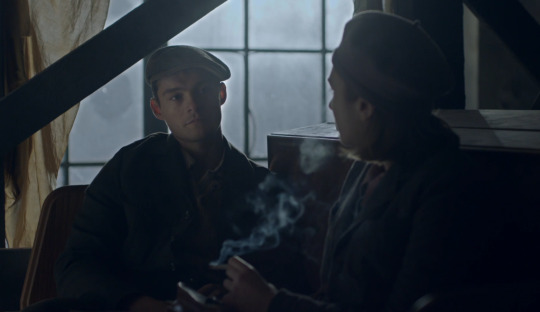
On the other hand, you have Kasia, who is also driven by compassion, but whose options for resisting and fighting Germans and Nazism are very different. The routine she has with Thomasz of luring soldiers into the ruins in Warsaw and killing them inside.
Kasia tells Thomasz that she cannot remember the faces of the men they’ve killed, and that is how it must be. It’s killing them inside to do this, but they cannot think of another way of avenging the Poles killed in the invasion and in the massacres since then. To make things worse, we as the viewers know the danger ahead. There will be no evacuation or backup for Poland anymore, and certainly no miracles for Kasia and Thomasz.
*For Grzegorz to reach France, he would have had to walk through Germany, the Netherlands, and Belgium. While it is possible that the British forces he met in the previous episode gave him a lift at some point between Konrad’s death and his last appearance in the episode, it still doesn’t answer how Grzegorz was able to cross through Germany. Even if between episodes three and four, Konrad and Grzegorz managed to get on a boat that would take them out of Poland, around Denmark, and finally to the French or Belgian coast, you’d think we’d get some scene of this. It’s even more unlikely when you consider that in the same time, Eddie has made his way from Paris to Dunkirk on foot with likely regular stops for employment. But that’s really the only big stretch of imagination this show has asked of us, so I’ll just have to let it go.
Notes
The newspaper shown in the first scene between Douglas and Robina is dated Tuesday, May 28th. If we’re to use the night scenes, Lois and Connie’s change of clothes, and Tom’s mention of the HMS Keith as a reference, then this episode takes place over four to five days, ending around the date the HMS Keith sank, June 1st.
Eddie playing his trumpet while waiting along the outskirts of Dunkirk is one of my favorite images of this episode:
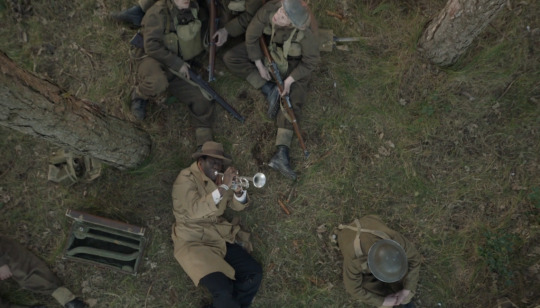
Resources and Further Reading
https://www.iwm.org.uk/history/what-you-need-to-know-about-the-dunkirk-evacuations
https://www.naval-history.net/xGM-Chrono-10DD-14B-HMS_Keith.htm
http://dunkirk1940.org/index.php?&p=1_187
Photographs
https://www.iwm.org.uk/collections/item/object/205194325
https://www.iwm.org.uk/collections/item/object/205194324
5 notes
·
View notes
Text
GOT showverse AU, Sansa marries Domeric instead of Ramsay
Some wordvomit on how using Domeric would smoothly integrate the North and Vale plotlines and wouldn’t stray as far from book!Sansa’s (and also Littlefinger’s) character after the cut. Warning that as Domeric is a Harry stand-in who was dead in the original anyway, he was doomed from the start.
I didn’t watch season 6 or season 7 because I ragequit at the Sansa/Ramsay wedding episode, I just know memes like “battle of the bastards” and “poisoned by his enemies”. Also I know nothing about what happened to the southern storylines until Dany showed up at Winterfell in S8. I’m a book gal.
Marrying Sansa to Domeric instead of Ramsay makes Littlefinger less stupid. This could go along similar lines as the Harry the Heir plot: instead of raising the Vale against the Boltons now that Tywin Lannister is dead and the Crown is weakened, Littlefinger could come to a deal with Roose to get him friends in the Vale instead of enemies. Littlefinger would then exploit the chaos of battle with Stannis/the existing tensions between Roose, Ramsay and Domeric to off each of them in some order, after Sansa has safely borne a child, after which he would become the power behind the North. Domeric is also a cultured nobleman with a good reputation as a tourney knight instead of a bastard serial rapist so it wouldn’t come across as a critical research failure on Littlefinger’s part.
How would we incorporate Domeric into the Game of Thrones story up to S4/5? You would need to introduce him in S1 at the Eyrie when Cat and Tyrion show up. Maybe before, during the Tourney of the Hand. When Cat is about to leave, give him a scene where he says “my lady, I would fight for you, I am a Stark man through and through” and Cat tells him, “ser, you would be of better service to House Stark here in the Vale, speaking for our cause”. In S2-S3 have Cat read dispatches from him about how Lysa isn’t being helpful, the knights of the Vale won’t march without her leave, etc. This would build up trust in the Boltons and kind of justify why Robb gives so much control over to Roose, and amplify the gut wrenching horror of the Red Wedding.
Begin the Sansa Bolton arc. By S4 when Littlefinger shows up with Sansa at the Eyrie we could have a scene with Domeric and Lord Royce (because they cut Lord Redfort) where Domeric says something like “what a family I have, my father the kingslayer, and my brother a would-be kinslayer”. Give him an angstbro moment where he is dejected because his father undid all the work he put in, give him the need to go on a redemption quest for something he wasn’t involved in. After Lysa dies when Lord Royce goes up to the Eyrie, give him a fluffy moment with “Alayne Stone” where he’s playing the harp alone and she sings along or something. Then at a feast, Lord Royce says his name, and Alayne flinches back, he mutters ‘even the novices at the motherhouse curse the name of Bolton’. Then he watches her and figures out that she’s Sansa Stark. He talks to Lord Royce about it, Lord Royce doesn’t believe him, and then the conversation with Sansa and Lady Waynwood happens where she outs herself. Then Littlefinger, Lord Royce, and Roose go into talks. Have Littlefinger recycle the “bewitch him” line he used in the TWOW sample chapter.
Preserve intrigue/suspense at Winterfell by pushing forward the Ramsay & Domeric Cain and Abel plot and make Domeric a player in the Northern conspiracy. Have Sansa use her observation skills to figure out what he’s doing. Have Domeric not involve Sansa in the GNC because 1) he saw her kissing Littlefinger and discuss their plan and 2) it’s about bringing back Rickon and he doesn’t want Littlefinger to know. Turn him into a paranoiac - ‘everyone at Winterfell is trying to kill me except for my dad, who I hate’. Have his opinion of Sansa sour while her opinion of him grows. Domeric’s suspicion of Sansa would also seed the Northern lords’ reluctance to follow her: they believe she is Littlefinger’s creature. Bonus: Sansa’s latent warging ability manifests in Ramsay’s hounds and she learns more about the intrigue at Winterfell.
Leadup to the Battle of Ice. Conflict swirls between the pro-Roose (+Ramsay) and pro-Domeric (Manderly/Stannis) camps at Winterfell. Too many men and mouths to feed, Roose needs to get them out to deal with Stannis. Sansa and Theon flee into the night, to Stannis. Jon receives the pink letter at the wall (but to add mystery, it’s probably not Domeric who wrote it). Mel and Selyse don’t believe it, they burn Shireen to grant Stannis victory, instead they resurrect Jon into wight!Jon. Confusion in the battle because Stannis has Sansa. Maybe Ramsay does something gloriously stupid like kill Stannis in a parley (let’s keep Brienne on the Arya plot) and now the Northmen just have to crush Team Dragonstone. Or, the conlfrontation ends without resolution, Stannis nopes back to the Wall, finds Shireen dead and his wife a depressed husk, and an heroes. Huge blow to the GNC, they all ride back to Winterfell in shame.
Ousting Littlefinger, the fall of the House of Bolton, Sansa vs Jon conflict. Knowing that the lords of the North still want the Boltons gone but won’t include her because of Littlefinger, Sansa’s attention needs to be on disentangling herself. She also has a personal motivation to be rid of him because he is a creep who keeps forcekissing her, and he killed Lysa. In the end I think Harry will grow on Alayne/Sansa at least a little bit, so Domeric has to grow on Sansa too. This is just a wordvomit so I don’t know all of the logical steps but Sansa needs to get rid of Littlefinger by herself without making herself look too bad by outing him to the Lords of the Vale and help Domeric get rid of Ramsay while Ramsay’s about to arrange a hunting accident, perhaps by warging into a dog. Domeric’s arc would be about Roose so he’d need to be the one to play the poisoned by his enemies card. Now that Sansa and Domeric are working as a team, enter Jon, stage right, dark!Wight with a wildling army to rescue his sister. Noone can find Rickon (shaggy dog story). Half the Lords of the North still want a son of Ned Stark, and like Lyanna Mormont said, “Lady Sansa’s a Bolton now” and Domeric is a kinslayer. Stark Bowl, get hype, it’s a Northern civil war. The Knights of the Vale come in to bail Domeric out but it’s too late. The Northmen make Jon KITN because that’s what happens in the show and also he killed Domeric, and they are still reluctant for a ruling Lady Stark without a husband. It was a real tragedy because this is Westeros. Now it’s time for the White Walkers and Daenerys plot.
Impact on Sansa’s character. At the end of the day I don’t think show!Sansa and book!Sansa are the same. IMO steered in a different direction from the girl who led the women in the Queen’s Ballroom signing hymns to the Mother, who asked for a maester for Lancel, and sang the Mother’s hymn to Sandor during the Battle of the Blackwater. The sass queen who goes “uncle, sit” to Edmure Tully is not the same person who helpfully finishes stuttery Wallace Waynwood’s sentences and spares him further embarrassment. This might be naive but I hope GRRM is going to have her retain her kindness, her mercy, her goodness while having her do things that are genuinely grey (her role in whatever happens to Sweetrobin for example). She would express regret, just as she expresses regret for outing Ned to Cersei. If her endgame fate is to end up alone, and not with someone brave and gentle and strong who loves her for her and fulfills a beauty and the beast metaphor, then I think the role Harry (Domeric here) would have played in her narrative is to have made her come to regret using someone as a piece on the board rather than treating them as a person valuable in and of themselves, with their own hopes and dreams and flaws and virtues. It happened to me, I did it to someone else, I am sorry, etc.
Thanks for reading my badfic outline.
5 notes
·
View notes
Text
MYP Magazine - Of Time And Truth.
[Original interview here.]
22/07/2019
Interview by Jonas Meyer. Photos by Steven Ludtke
[I skipped the introduction and went straight for the interview]

Jonas:
When the first season of “Dark” was released in December 2017, viewers and critics alike have literally fallen over their enthusiasm. So far, many had not expected such quality from a German production, especially in terms of dramaturgy and visuality. How did you, as a Netflix consumer, experience the series start then?
Louis:
Luckily I’ve been able to enjoy the series as a relatively normal, objective viewer - and that’s true of the current season two. In “Dark” there are several roles and plot-lines, in which my character Jonas does not take part and which I accordingly did not know about from the shooting. During the shoot, I tried anyway to push aside all the other plot-lines and focus only on Jonas Kahnwald. Otherwise, I would probably have gotten pretty confused because the content of the series is so complex.
Jonas:
What is the difference between the current season two and the first one?
Louis:
In Season 1, it’s all about something that happens individually to each character which they have to deal with. In the second season, these characters are much more active, especially Jonas. At the very beginning of the series he is still very passive and in the course of the episodes he has to learn how to handle the issues himself. In the second season, he already knows who he is, what he means and what he needs to do to achieve his goals - and of course, what he has to sacrifice. But all the other characters learn, too, overall, the knowledge of each character acquires in the course of the second season is much larger. In addition, I would say that this second season is also more emotional. Now much more information will be passed on to others which changes their view of the world.

Jonas:
On the platform kino.de there is an episode guide to the first season, in which it is said that a single viewing of the series is not enough to recognize all the contexts and hints: “Often, a short distraction like reaching out to take drink or a look at the clock is enough to miss an important detail." Do you see it the same way?
Louis:
The series is definitely complex, I agree. And with so much information to be conveyed in Season 2 to drive the story forward, this second season may be even more complex than the first one. Jantje Friese and Baran bo Odar have always emphasized that with "Dark” they wanted to create a series that challenged viewers in a certain way. By the way, that did not happen until then in Germany - here one tends to play it safe. After the release of the first season, funnily enough, there were critics on the one hand who said that the series was too complicated. And at the same time there were critics on the other side who complained that we were guiding the audience by the hand way too much.
Jonas:
How did you deal with the high complexity, which is created solely within the character Jonas Kahnwald? Is there always an overview, even if you concentrate only on your own narrative thread?
Louis:
Of course we all lost the thread every now and then. But thank God there is Jantje, who has the complete perspective. She knows down to the last detail how, where, what, and when something happens. During the shooting for the second season, we also had a Script Supervisor, to whom you could always turn. In addition, there were special screens on the set, where you could play the entire first season - in the event that you wanted to look, which specific point refers to a scene for which one is just in front of the camera.

Jonas: Lars Montag, director of the Netflix series “How To Sell Drugs Online (Fast)”, revealed to us in an interview recently that he has the feeling that since Fassbinder there is actually no German narrative anymore. He said: “All are just trying to imitate Hollywood in any way.” Do you think it requires a special German narrative style - just as the Scandinavians, French or English people attributed to their very own cinematic narrative style?
Louis:
Definitely, no. I think we live in times when everyone is trying to make something special. This alone starts up more and more narrative styles. This can be observed even among the Scandinavians, who are said to have a particularly strong stereotype in imagery and narrative style. The reason for this development is that we all talk more and more international - but that does not explicitly mean that we are more Hollywood-oriented. For me, telling an international story means that we can address viewers across countries by means of certain narrative styles and therefore do not have to reduce ourselves to our local schemes.
Of course, it still needs different narrative in film - but not to emphasize the national location, but to be able to address the most diverse types of spectators. Quite apart from that, there is not one big secret recipe of the Hollywood narrative that you have to use to reach out to people. Rather, I believe that it is much easier today to break out of this Hollywood compulsion - simply because the audience has become much more diverse.
Jonas:
The trailer of the second “Dark” opens with a gloomy, post-apocalyptic landscape in which a destroyed nuclear power plant can be seen. Is it not strange how realistic and quite imaginable such fictional images are when viewed in the context of the current social debate about climate change and impending environmental catastrophes?
Louis:
When talking about the future, there are two main scenarios that seem possible: one is an extremely modern and thriving science-fiction world of flying cars, where everything flashes and shines. The other is just the opposite: a dark scenario in which everything is destroyed - because we humans have destroyed ourselves. In this scenario, nature slowly regains the upper hand and runs us down. With “Dark 2” there was not necessarily the intention to create parallels to this second possible scenario. But it is actually noticeable that these pictures do not seem so unrealistic in this day and age.

Jonas:
You recently appeared in the Arte short film series “Couples” with Dutch actress Hannah Hoekstra. You play a young couple who discusses whether it is appropriate to paint the German flag on one’s face, such as at a game of the national team. He gets mad about it, she does not understand his problem. How do you personally look at this country at the moment?
Louis:
With shame and concern because the most important and threatening topic in the world - climate change - is not taken seriously. There seems to be a kind of change of heart, which is also expressed by the fact that the Greens temporarily lead in the polls. Nevertheless, I always feel stifled when I realize how climate goals are ignored and Germany - which has a certain role model function - fucks it up. I think that’s really sad. I sincerely hope that this green trend will not be short-lived and will continue because we simply have to make sure that this earth is not doomed to destruction in 30 years’ time. When I deal with the predicted, catastrophic consequences of climate change, it scares me. In view of this threatening situation, I do not understand why young politicians are not getting much more involved in Germany. Their job gives them a huge stage! Unfortunately, this stage is only used by the fewest. But now they have the chance to finally speak out truths. But it is only blabbed. If you listen to some of these politicians, you want to shake them and wake them up.
Jonas:
In recent years, you have greatly reduced your social media activity. You could use your popularity and the associated reach to give more space to certain issues in public discourse. Why did you decide to withdraw from the social networks? Don’t you feel like you could’ve made a difference?
Louis:
Of course, with a certain amount of followers and the range involved, it is possible to spread your own opinions and influence those of other people. But for me it has always been difficult to position myself in the social networks on specific political issues. Although it was relatively easy for me in the run-up to the European elections to call with my posts to go to the polls. Otherwise, I’m more careful. I’ve probably missed the chance to tell people my opinions for a long time. By the way, others manage to do really well, which I admire very much. But in my case it was a very selfish decision to delete my Facebook account and withdraw heavily from Instagram.

Jonas:
To what extent?
Louis:
It just did not do me any good. I always had the feeling that I must post something to entertain people. That totally unsettled me and put me under pressure. That’s why I decided to get rid of it. I did not think Facebook was necessary anyway. The decision to stop using Instagram came last year during the shoot for the second season of “Dark”. At that time, I was generally under a lot of pressure. And when there are other components, such as social networks, that add pressure to me, it all got too much. My Instagram account still exists and I post pictures from time to time, but I have to reinstall the app every time because I delete it after each post. In principle, I myself have no access to my Instagram profile. When I want to post something, my girlfriend has to sit beside me because she has the password.
Jonas:
What was the reason that you were so under pressure last year?
Louis:
There has not been any time in my life when I felt more pressure than in 2018 - pressure was my word of the year. That’s because the year before was the craziest and most extreme year I’ve ever experienced, in any way. I have tried to tell myself over and over again, “Louis, 2017 will not be repeated. Take care and get ready! "But I was not ready. 2018 has completely overrun me - due to the extreme expectations, which were suddenly felt from all sides. For the audience, the journalists and the critics, it is a natural fact that you are always good. If you’ve played some good roles, everyone expects you to keep doing your job properly. This matter of course has affected me much more.

Jonas:
How do you feel about seeing yourself on the screen?
Louis:
That’s OK in principle - I really want to see the work I’ve done. But I can really enjoy a movie as a viewer only if I do not have to rate my own work. Overall, I am very critical of myself and therefore quickly dissatisfied. Sometimes I would wish that I am not so hard on myself, because that would make me more free in the way I work. It hampers you a lot when you’re too scared of failure or too much pressure - you realize, pressure is a big issue in my life.
Jonas:
In a few months, the film "Deutschstunde” will start in the cinemas, for which you have taken on a supporting role. In the film adaptation of the novel by the same name by Siegfried Lenz about an expressionist painter, where a prohibition of the profession was imposed by the Nazis in 1943. This repression existed in Germany not only at the time of National Socialism, but also in the former GDR. In some countries, such as China, even today, professional bans are being imposed. How would you react if you were no longer allowed to be an actor?
Louis:
I have never asked myself this question. It makes perfect sense to consider it. I suspect that I have never dealt with the question because here in Germany we are in a very privileged situation where we are allowed to practice what we want as a profession. If that were forbidden, I would be completely at a loss. Acting is what I do best of all activities and what I like to do most. There never was a plan B in my life either - so I would not know what to do with myself.
Jonas:
Can you “not act” as an actor at all?
Louis:
Of course, in everyday life you can stop it. However, every actor is inclined to be a permanently on game, such as with jokes, gestures or certain behaviors. It is easy to express oneself. I believe that in order to give the truth to a person, one must draw truth from oneself. And if you no longer have truths, you can not play them. On the other hand, I have the experience that I always take parts of my characters into my own life or discover new things about myself through them. In other words: through the role, I open a box, which then remains open a bit. As a result, my roles always change a bit for me as well. For example, I feel like through the many sensitive characters that I was allowed to play, I have embraced the sensitive side in myself more - unfortunately I can not find a word in German with which I could better express that. What I mean by that: Had I not played so many sensitive characters, today I would be a sensitive person, but not to the extent that I have become in the end.

Jonas:
Which of your projects has been the most emotionally charged so far?
Louis:
I would say that was “Prélude” by Sabrina Sarabi, which will be released on August 29th. In the film, I play the young piano student David, who suffers from strong self-doubt and feels a huge pressure of expectation - a situation that I can understand very well, as already mentioned. However, with David, he loses control of his life and threatens to break under the pressure.
This movie is the first one I for which I have prepared with a coach. When working with acting coach Frank Betzelt, it was especially about how the energy between the individual characters felt, what these energies wanted and how they influenced the characters. That helped me a lot to dig deep into my role. For example, I have discovered a much greater access to the feeling of anger, mainly to self-rage. I personally did not know that feeling before. Until then, I have never felt the need to be angry, let alone gain access to this emotion.
All in all, during this time I let David’s emotional world come close to me - and literally took it home with me. That put a strain on me not only during preparation and shooting, but also for almost a whole year afterwards.
Jonas:
How exactly?
Louis:
For example, a few months after filming, there was an incident that happened when I was visiting my parents in Cologne with my girlfriend. After watching a couple of episodes of “Babylon Berlin” with Liv Lisa Fries - Liv plays my girlfriend in “Prélude” - I felt an extreme unease in the next morning. I was kind of aggressive and in a bad mood, which kept increasing throughout the day, until I finally just collapsed in the evening. Probably the situation with my parents at home and with my girlfriend on the side gave me such a safe space that I could process all this again. There was apparently no real opportunity to do that before because after the “Prélude” shoot exciting things kept happening. I had the impression that I had dragged this topic for months and only let everything out during my visit in Cologne. But I did not really get rid of it. When I saw the movie for the first time some time later, I was really sad for two or three days and did not know why. So I called Frank Betzelt, who had coached me then. He just asked me one question: “What really bothers you? The fact that you are so sad or that you do not know why you are sad?”
Jonas:
What a clever question!
Louis:
An incredibly smart question! My answer was, “Because I do not know why this is happening to me.” And then Frank said it was fine and I did not have to fight it. The reason for this is that I have grown so fond of the character and thereby experienced the suffering of this young artist even more intensely. We talked about it for a while - and after that phone call it was OK.

Jonas:
Kat Frankie, a singer-songwriter living here in Berlin, wrote the interesting sentence: “People that write sad songs are a little happier.” Is that similar to actors who play sad roles?
Louis:
You can say that the other way around too - look at Robin Williams, who was hilarious in his roles, but must have been extremely sad in his private life and finally took his own life. Basically, I think that actors who play a lot of melancholic roles, also need a certain fascination. And if you have that fascination in general, you have it when you’re not acting as well.
Jonas:
If you ignore the expectations of other people: What is your own claim to yourself?
Louis:
I have a very high standard of myself and I am extremely ambitious.
Jonas:
That means you’re also prone to criticism?
Louis:
I’m trying not to be that. It’s a bit strange to me anyway: I’m really excited about criticism and sometimes find it strange when there’s none at all - especially when I know for sure that there’s something to criticize. At the same time, it is not so easy for me to handle criticism when it is actually voiced, especially if it comes from myself. I wish that was easier.
Jonas:
Are you someone who takes things from peers?
Louis ( smiles ):
Off or on? No, seriously, I think you have to make sure that you can focus on your own work and not get too confused by the hype that is often justified by some of your colleagues. But I also think it’s just right as an actor to keep your eyes open and to be inspired by what’s being done elsewhere. But we should all be in this world anyway, no matter if actor or not.
14 notes
·
View notes
Text
Devilish Acid Doomers LáGoon Reveal The “Father of Death”
~Doomed & Stoned Debuts~
Review by Billy Goate, with Stephanie Savenkoff

Some days you just need a good swift kick in the pants to get the week going. Portland acid doomers LAGOON got you covered with 'Father of Death' (2020). It's the band's second album so far this year, marking an especially prolific period for the Portland band. Hell, we just got through reviewing and debuting 'Maa Kali Trip' (2020) back in March. Indeed, the band reminds us, "There aren’t rules to this shit, despite what anyone may tell you. We figure, release the music as you make it. Two full lengths in 3 months, why not?" You won't hear any objections coming from this end, fellas.
The new spin also witnesses LáGoon’s core transformation from duo to trio, something which has obvious ramifications for their sound. Featured on this effort is bassest Ignacio De Tommaso of Luciferica, and Argentinian band we heaved profuse praise upon during a recent episode of The Doomed & Stoned Show. "Same skate rat doom sound," LaGoon assures fans, "just in louder form."
The bass is the first thing that hits us with a wallop straight away in the title track. When I learned that Doomed & Stoned's tireless Portland photographer Stephanie Savenkoff was likewise immersing herself in the new LáGoon album, I asked if I could share her notes. "Great fuzzy beginning," she observes. "Repetitive and trancey." The song appears to be about a godlike figure who holds the power of death in his long, boney hands. Singer Anthony Gaglia personifies him with appropriate dramatics. "Love that sneer!" Stephanie adds "Reminds me of Billy Corgan."
"Resuscitation" by contrast is "stripped down" with a "peaceful opening. Simple but moving." Were I to match the music with a narrative, it would be of someone awakening from a near-death experience -- or simply from blacking out, as I once did in a local grocery store (took down a whole shelf of Gatorade with me, too). Waking up from that otherwise peaceful step out of consciousness was a blurry, surreal ordeal. Soon, the unreality of it all came flooding back and I struggled to make sense of the events leading up to it. I imagine this is doubly so in the case of an NDE. Thus, we move from the serene to the stormy as the patient is resuscitated. Stephanie notes its "surfy center, energizing," and hints at Spanish rhythms with one final word: "Bandito!"
A "simple, mellow riff" begins "Bloodied Mouth," then "builds and intensifies," Stephanie suggests, offering us a "cool spark at the end." I can't help loving that Brady Maurer rhythm. His drumming makes this fundamental rock 'n' roll, the kind you wanna really twist to -- LaGoon's trademark menacing twist, that is.
Speaking of all things sinister, "Broken Oath," is "creepy and funereal" Stephanie says, an atmosphere conjured in no small part by guest keyboardist Adam Scott of Thunderbird Divine, who makes effective use of the Mellotron. We also hear, I believe, two sets of vocals, which I'm fairly certain is Ignacio De Tommaso's or one of his compadres.
"Soft, sweet, gentle, intense, beautiful, dark." Those were the words that converged with Stephanie's stream of consciousness for "Stab & Cut." Lyrically, it feels full of alienation and the need to protect oneself from the many enemies of happiness, some of which are more insistent than others in taking away our roadmap. Thankfully, there's still that trusty van to get us over the winds and dips of the road ahead.
As we might expect from an album conceived in quarantine, parts were recorded separately by various members of the band during lockdown, then mixed and mastered by Anthony himself. I'd say he did a damn fine job of it, with the usual low-fi ethic in play.
And now, Doomed & Stoned is pleased to bring you the title track from Father of Death, which emerges June 19th and can be pre-ordered here.
Give ear...
An Interview with LáGoon Frontman Anthony Gaglia
By Billy Goate
LáGoon is now, what, four, five years old?
Just approaching 4 years!
Hellll yeah.
It’s been a good run!
What was the last show you played before the Great Lockdown of 2020?
Took me a second to remember it’s been so long! Our last gig was March 6th alongside fellow PNWers Grim Earth, Sorcia, and Ravine!
Right on. I think Stephanie Savenkoff may have been there to snap some pics that night.
She was, indeed; always great to see her at our shows!
You've got some big things happening this month, right?
We do! Our last album, MAA KALI TRIP, has finally made its way out of the record plant (pusher back due to Covid) so this Friday it will be available for purchase, and then the Friday after that we’ll be releasing our new album Father of Death!
Listening to that opening track on ‘Father of Death’ (2020) you can tell something is different. The bass just jumps out at you with bold ferocity! You’ve got a new member? Please introduce us.
Hell yeah! The man behind that thunderous tone on the record is Ignacio De Tommaso of the band Luciferica. Ignacio and I have been collaborating on some music for the past few months, so when it came time to lay down bass on the record he was the perfect man for the job!
What was it like to jam with a third person after being a duo for so long?
Refreshing! At first being in a two piece was great because I had just left a 5 piece band, and that was a headache. But after being the two of us for a while, it feels great to have someone else on board so I can play some solos and overall broaden what I can get away with playing!
Do you feel any urgency to expand your number in real life when the bars and concert halls open up again along the West Coast?
Definitely. I want to start playing these new songs in their entirety as soon as things open up. I really feel like this album is the new sound of LáGoon, and I’d hate to step backwards for live shows.
How would you describe LaGoon’s core sound and approach to heavy music?
It’s hard for me to describe, but I think the most important piece of LáGoon’s sound is that we’re really not concerned with fitting under one particular label. We all listen to a variety of music, and I think that comes through in the music. Our biggest concern is keeping things fun and fresh for us, and we’ve just been blessed that some people seem to really dig it!
What styles of music would you say you draw the most inspiration from?
Those are constantly changing, but going into this album I was listening to a lot of 90s bands like Sonic Youth, The Pixies, The Melvins, and The Butthole Surfers. Which are bands I come back to time and time again. There’s something about the music that was made in the late '80s to early '90s that has a ‘I don’t give a fuck’ rawness to it. Anything that sounds like it was labored over isn’t the vibe for me.
Is it just me or do I feel a kind of chill surfer vibe thing going on, too? It's probably just me.
You’re not wrong! I think that comes from the type of people we are, or the amount of weed I consume haha. It’s pretty hard to get any of us upset, and so I think that there’s definitely elements of that in our music.
Right on. How have the last 3-4 months of shutdown and lockdown affected you and the people around you?
It was pretty hectic at first. I haven’t been working since the shutdown, so financially it’s definitely been a struggle. My mom and sister are both nurses as well so it’s been pretty scary to hear about all the madness in their hospitals. Overall, I’m happy to be living in the city and state I’m living in. Everyone I know has taken it seriously and that’s refreshing!
That's awesome to hear. Well, on a positive note, maybe take a few moments to tell us about the new album and walk us through all five tracks?
Would love to! This album largely came about because of all the free time I’ve had over the quarantine. As we mentioned before this is our first album as a three piece. I made that decision going into the album, so most of the tracks feature guitar solos and other elements we couldn’t pull off as a two piece.
FATHER OF DEATH
"Father of Death" is the first track on the record and the title track for the album. It sets the pace for the album with a driving tempo and the introduction of the bass as part of our sound. The song is about the grim reaper, a character that regularly surfaced in LáGoon songs.
RESUSCITATION
"Resuscitation" is the song that is just that for this band. It’s the first song of ours that couldn’t be played without the bass, and brings a new life and sound to the band. It’s also one of our longest songs and has multiple tempo changes.
BROKEN OATH
"Broken Oath" features another friend and label mate of ours Adam Scott of the band Thunderbird Divine on keys and melotron. This is one of the heavier songs on the album, and tells the story of a man cheating on his wife with a prostitute.
BLOODIED MOUTH
"Bloodied Mouth" is the most danceable of the album. This song was written at the beginning of the COVID crisis when everything first shut down. I felt a little beat down, and this song is what came out.
STAB & CUT
"Stab & Cut" is probably the furthest from any of the other songs we’ve written. I wrote it as an acoustic guitar song years ago and had forgotten about it. For some reason I played it on my electric guitar one day while I was recording other songs for the album and it brought new life to it.
That’s all of 'em!
Cool, thanks for sharing that! What instruments and gear are you working with these days?
I’ve had the same Orange CR120 head and Marshall 4x12 since the formation of the band! For a short period I was playing split through that and a bass amp, but now that we’re a three piece I’m back down to the Orange through the 4x12 and I have one distortion pedal that I more or less just use as boost. We’re lucky enough to have a deal with Baxter guitars so that’s all I play and we’re hoping to get a Baxter bass on stage soon!
First Coronavirus, then Lockdown, Recession, and Social Unrest. Any predictions on what the second half of 2020 holds in store?
I have no idea, but what I hope for is serious social reform at the federal level, a new fuckin’ president, and the return of live music. I may be asking for too much though. (laughs)
Sounds like you're just itching to get back on stage again and belt out these new tunes for a real live audience!
Absolutely! My wife is getting sick of hearing me play by myself! (laughs)
Right on, man. Well we hope to see you soon, so we'll keep our fingers crossed for a bright close to the year. Thanks so much for chatting with Doomed & Stoned!
Hell yeah, man! We appreciate your continued support. See ya out there. Stay healthy, and stay heavy!
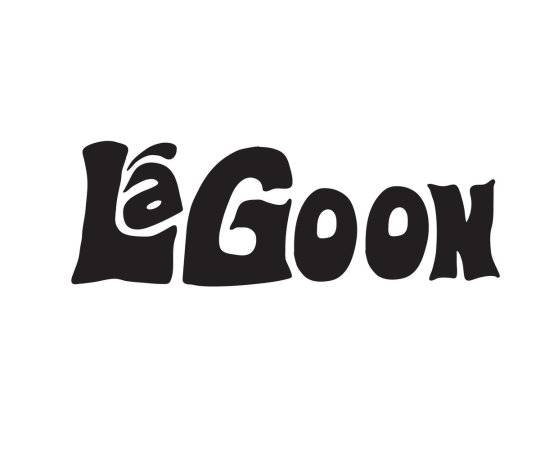
Follow The Band
Get Their Music
#D&S Debuts#LaGoon#Portland#Oregon#Doom#Punk#Metal#Doom Metal#Anthony Gaglia#D&S Interviews#D&S Reviews#Interstellar Smoke Records#Forbidden Place Records#HeavyBest2020#Doomed & Stoned
1 note
·
View note
Text
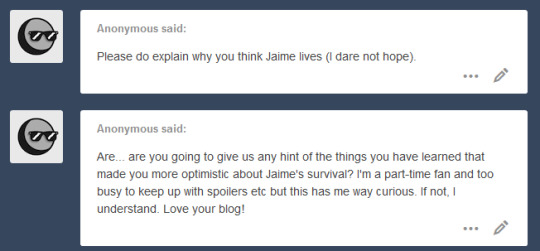
Okay this is going to be long haha. As a disclaimer, Jaime can still die. This just explains why I’ve become skeptical over that fate.
I have not been given a straight answer to Jaime’s fate by any of the people I have spoken with, and I can’t be too detailed in my explanations because of reasons, but this is what I can say:
1. Jaime doesn’t die in the battle of WF. I’m making this clear because this has become popular spec. Now when I say die, I mean permanently dead, not resurrection dead. I have no info about any resurrections, so it’s entirely possible he can “die” and still come back. All I know is that Jaime is definitely alive after the battle of WF, so don’t listen to any leaker who says his final farewell is during that battle. I know of a specific event (actually, two of them) that happens after the WF battle, and he’s very much alive for it.
2. Jaime is in all 6 episodes, and no, that information is NOT taken from Nikolaj’s contract. I can say this with 99% confidence.It’s possible he could be in less depending on how they move scenes around in post production, but at least during filming, every person I spoke with was certain he was in every episode.
3. Jaime is not dead during Tyrion’s trial in episode 6. Tyrion’s trial is AFTER the KL battle.......... sooooo.................
4. Okay this really isn’t anything lol but, they were all pretty excited to tell me what happens, and wanting to tell me “so badly!” while… knowing I want him to live. Like I said, that doesn’t mean much, but I’m giving them the benefit of the doubt and assuming they’re not, like, Satan or something. “Omg you want him to live so I’m so excited for you to see him DIE! :D!!”
Recent Observations:
This isn’t what I’ve been personally told, but this is what I have observed in fandom over the past few months. Take all of this with a grain of salt. I’m only including these because they got my attention, considering what I know.
1. There have been a couple randos that have popped into fandom just to say that everyone is wrong about Jaime because he lives and then they poof. Like I said, take this with a grain of a salt. It probably is nothing, but they always stood out to me as suspicious.
2. Recently, someone said they spoke with a family friend and that friend said a person everyone thought would live ends up dying and someone who was “seemingly marked by death from the beginning” would survive. This actually can’t really be argued for any character. Not every character has been around since the beginning, and only a handful have been “marked by death” in the eyes of fandom.
Speaking on average: Jon, Dany, Sansa, Arya, Bran, Sam… all of them have fairly uncertain fates or the assumption of survival. Minor characters? No one is going to care so much about their fate to give a spoiler about it (“oh man dude! Melisandre LIVES! People will freak!”) or the others haven’t been around since the beginning… IMO, there are only two characters that fit that description: the twins. Considering I have good reason to believe Jaime may actually have a chance at survival, and since literally every sector of the GoT fandom, including the JB fandom, he's talked about as if he’s already dead, I’m going to make an assumption here and apply that to Jaime. Out of the twins, Jaime has actual potential set up for survival, Cersei not so much.
Narrative:
As much as Jaime’s death would fit the traditional mold for the path he is currently on, there is setup for a possible survival in the books and the show. I had always envisioned his fate going either way, and was confused why people would be completely convinced of death or survival. I felt both had set up? I went from thinking he was doomed, to thinking he would survive, to being totally unsure, back to thinking he’s dead again, and now I’m residing in survival camp.... for now, at least lol.
I could go on and on and on with the support in the books. I could describe a different interpretation to his weirwood dream, dig up quotes about how he’s yearning for fatherhood and a married life and how he thinks he will only ever be a warrior, explain how the hand chop was his “death,” moan about how eye-roll worthy it is for him to be a Stark prop. I can find evidence to argue that he’s simultaneously being molded into a leader and heir and therefore it would be a wasteful death that accomplish nothing. I can also blab about how Brienne is basically his plot armor because of how ridiculously redundant and meaningless it would be for HER arc if another person were to die in her arms and leave her exactly where she started (actually, no, I’ll probably still talk about this with the show evidence because it annoys me). But since this is a somewhat show-themed post, the question being about season 8, I’ll just stick with the show evidence.
Show Evidence:
1. Watch: Jaime and Tywin’s conversation #1 , conversation #2, conversation #3. Look. The show decided to include THREE SCENES about marriage and the Lannister Legacy. THREE................
“Oh but in the first one he says that he doesn’t want the Lannister legacy to fall like the Targaryens did which foreshadows the Lannisters going extinct.”
Jaime fulfilling his duty as heir has been brought up T H R E E times.
And the Targaryens went… extinct? … I mean… who are the two leads of this series? If they’re going to parallel the Targaryens in some form, then that means they definitely don’t go extinct. Baby Lannister left behind? Possible. But…
2. Jaime is removed from the KG in season 6. Why? In the show he... didn’t need to be removed from KG so he could later on leave Cersei (even in the books he ran off while still on the KG). Brienne says Fuck Loyalty and he Fucks Loyalty anyway. They could have had him do that while still member of the KG. It was perfect setup. Tywin wants him removed so he can fulfill the Lannister legacy, Jaime eventually gets removed. What’s the point of removing him from the KG to simply lead the Lannister army for two seasons and then die if he could have been doing that anyway as LC? They removed him from the KG because he’s being molded into an heir and freed of vows for endgame. And, again, connects to the Tywin conversations.
3. Purple Wedding. Ah, one of my favorites. (<- that one kinda sucks because the youtuber edited Brienne’s walk to be more quick but you still get the point)
When Loras and Jaime are having a conversation, Jaime says, “You’ll never marry [Cersei]” and Loras responds with, “And neither will you.” Loras walks away, Jaime looks down, Brienne walks past and Jaime looks up. Keep in mind GRRM at least wrote the Cersei and Brienne portion, and it was even mentioned that they paid attention to the transitions. when filming and editing.
Minor detail to mention: the Bear and the Maiden Fair is playing in the background.
”lol that song has been used before for other people.”
Yeah... for marriages. Not only has it been consistently used for Jaime and Brienne - also season 3 when they’re captured and used as the episosde title for the bear pit- but the other times it has been used were for: the wedding feast between Tyrion and Sansa, the wedding feast between Edmure and Roslin, and then the wedding of Joffrey and Marg... and when did it play at theirs? During the Jaime and Brienne scenes, literally during and after Loras told Jaime he would never marry Cersei and then Brienne walks past and then Cersei accuses Brienne of being in love with Jaime.
“It just means Jaime won’t marry Cersei because he’ll fall in love with Brienne.”
Maybe? But he’s already simultaneously falling in love with Brienne and he was (in the show) still trying to marry Cersei? Why is a theme of marriage hammered in so often then? (like Brienne’s monologue, which I’ll get to)
Maybe I can also throw in this more tinfoily bit in. “Maybe you’re a Lannister too.”
4. “Die in the arms of the woman I love.” -sigh-. Okay, I admit, the first time I heard this I jumped on the SEE JAIME IS DEAD bandwagon and was firmly stationed on that wagon until I got info that started raising my hopes and then Brienne’s, “nothing’s more hateful than failing to protect the one you love” popped into my head and I’m like

and then “who wants to die defending a Lannister.” Yeah yeah, “who wants to die defending a Lannister” is simply foreshadowing Brienne’s love for Jaime and doesn’t necessarily mean she will die (she at least survives to episode 6, after the battle). But if you take that and mix it with “nothing’s more hateful than failing to protect the one you love” and stir it in a pot, you got yourself Brienne making a move that almost gets her killed to save Jaime and NOT fail the like 4th or 5th person just because.
That line about failing is so often overlooked. Yeah, of course it’s possible it can mean she fails again, but I’m just… even if it doesn’t foreshadow shit, it made it clear that failing the one she loves is a thing she wants to avoid so... why the hell would the story have her fail another fucking person? What’s the point? She feels like she failed her father, failed Renly, failed Catelyn (more in the books), she’ll probably feel that way after Pod bites it, let’s have her fail Jaime too! :D! Let’s also be repetitive and have a guy die in her arms again just to rip her heart out and leave her exactly where she started just for the demonic lolz (btw I never subscribed to GRRM being as blood thirsty as people make him out to be). To me, that line sounds like she’s going to do everything in her power to not let that happen ever again. There will probably be a close call where she thinks she failed but doesn’t. Jaime saved her twice, maybe she will be the knight in shining armor and save him.
“Okay but what if she’s left with his baby? She’s not exactly where she left off then.”
No, she’s not in the exact same spot, and that’s a scenario I definitely find plausible. However, she... still kinda is? Stripping her of the only person who has ever genuinely loved her in that way sends a message that society is correct- Brienne, an ugly, undesirable woman- is unworthy of love. Brienne is unworthy of a long, happy life full of love because the Gods gave him to her for just a bit, dropped a baby in her lap as a consolation prize, and took the one person who has ever genuinely loved her for who she was.Normally I would argue that GRRM isn’t writing a story that gives characters everything they deserve. And I agree with that, but I’d argue that he’s using Brienne to literally tell a message of BatB. Inner beauty triumphs, superficiality does not (Cersei being example A). The message isn’t as effective if this rejected, freakish, beast of a woman continues to feel like a failure, continues to get fucked over and remains fucked over in endgame.
Now back to “die in the arms of the woman I love.” This line was used to set up the JC downfall to the viewers, and get Jaime questioning by having Bronn say, “does she feel the same?” On the surface it’s Cersei, the subtext is Brienne. That was it’s purpose. But I tend to agree with the people who say it can also be foreshadowing. So can he still die? OF COURSE! Will I agree with the narrative decision? NO (explanation further down). Can he die and be resurrected like a literal BatB tale? YEAH! Can it mean that he dies in the arms of the woman he loves as an old man? SURE! There’s multiple interpretations here.
Going back to the last one, I find it curious that immediately before Jaime mentions his preferred way of death, Bronn said he wanted to die as an old man in his castle with children groveling at his feet for his fortune and Jaime makes a comment about how that’s boring. So, I’d find it kinda funny then if the two desires were combined. (and Jaime never said in a battle, btw. The scene he describes is romantic with no context).
5. Brienne. Don’t tOUCH ME. Okay.
a) She told Catelyn she wasn’t a Lady, told Pod she wasn’t, Cersei told her she’s a Lady whether she wants to be or not... her insecurities over being a Lady is CLEARLY a theme that the show decided to keep. And then there’s this scene. Brienne fulfills her oath by keeping the Stark girls safe and getting them North. Pod calls her my Lady, Brienne begins to say she’s not a Lady, stops herself, and then thanks Pod. why is this always ignored?? This is saying that plot is done. Brienne is done being a bodyguard (which is also made crystal clear in Season 7 when Sansa basically tells her she can protect herself and Brienne tells the Hound that Arya doesn’t need protection). Brienne’s acceptance of her title is the story saying that Brienne will move on from this dragged out af plot and will now get ready to fulfill her role as Lady/heir. So what does this have to do with Jaime? Ahem. Well who else is being groomed for the role of Lord/heir?
b) I’ve been dying for them to finally give some book canon backstory to Brienne and show her vulnerable side. I was pleased in season 5 when we were delivered a wonderful little nugget that isn’t straight book canon, but an adaptation of it. Look, the fact that they even CARED to adapt this for the show is huge. Here is the scene.
The addition of this scene is important because it’s Brienne literally telling Pod (and the viewers) that the happiest she has ever been was when all the boys wanted to marry her and take her back to their castles. It’s reminding the viewers that romance is a major theme of her arc. They had her specifically mention marriage and living a domestic life in a castle and that made her fucking happy dude. The happiest she had ever been.
Now… why? Why is that necessary if Jaime and Brienne are just destined to bang and then he bites it? If they wanted to highlight that Brienne is a sexual being that wants to be loved, they literally could have taken out the whole marriage and castles and kept it as the boys dancing with her and complimenting her and flirting with her made her happy. But no, they brought in marriage. She wants marriage, man. She secretly desires the life of a Lady, with the one she loves, and that’s okay. And do NOT tell me that her destiny is to be some bodyguard for the Starks. I already wrote like 4 paragraphs on it but deleted because… not the place. Anyway, they adapted the marriage bits because it’s something that comes up in Brienne’s chapters quite a bit. (The lions on the cloak as she watched the boy she was to marry walk away and Jaime putting a cloak around her shoulders are probably my favorites).
“But what if they marry and then he dies!”
Oh, a little spoiler: Let’s just say it doesn’t seem likely they marry on screen. Possible, but very unlikely. So if they marry, marriage would have to be implied after the show... -whispers- which means he would have to survive.
Also, I already explained why I personally find that an ineffective ending, but again, is it possible that’s the version being told? Hell yeah it is. This is why I’m not completely convinced of his survival, and why I have always been open-minded about his death, and have gone back and forth depending on how much I trust the quality of writing. In most redemption arc narratives the character dies because death itself is something they have avoided, usually by obtaining power or through an exploration of a courage theme. Jaime has already proven he’s willing to sacrifice himself and has accepted his death on many different occasions (ex: he jumped into a bear pit with one hand and no weapon with literally no plan, and on the show he charged a fire breathing dragon head on with nothing but a spear I mean....), so what does his death as a knight really accomplish for his character besides, “it’s TRADITIONAL! Redemption = only DEATH! Knightly honor = only DEATH!” (I can feel myself going down a rabbit hole by wanting to talk about the hand chop so I’m going to stfu now because this is getting ridiculously long.)
“GoT has been inconsistent in the past and sometimes they do things that make no sense.”
I know, and it’s still entirely possible the execution of this story is trash and everything was pointless. That argument could apply to literally everything I say in this post. But at the same time, GoT is shit at being subtle, and when they want to drive a point or theme home, they do, even if it’s sloppy. (and yeah, like mentioned, I see this in the books as well... I’m not basing my opinion entirely on the show. It’s just if I add book bits on here, it’s going to get even more boring than it currently is lol.)
“Gin, sorry, I just disagree with you.”
That’s okay! It’s possible I end up changing my mind 50 more times, based off of the info coming in. Guys, I just think this story can be DIFFERENT. I’m so goddamn tired of the same, predictable narratives. And also because, like I said, I see potential set up for survival. I see all of the different interpretations. I’m tired of seeing people act all arrogant, like the answer is already there, when I see evidence for at least the possibility of something different.
Like we can’t even fucking discuss his survival in fandom, and if someone even BREATHES it they’re called delusional or in denial, even by their fellow JB shippers. NO? I just see multiple paths and interpretations?? And... to make it even more confusing I’ve been receiving optimistic hints that have raised my hopes??????? Fuck, I’m basically a victim here because I had been comfortable assuming the worst lol.
I’m legit procrastinating on posting this because I have anxiety putting it out there. Discussion of his survival is that unpopular.
#jaime x brienne#brienne of tarth#I totally just talked to myself throughout the entire post#and#I warned you it would be long haha#..#.#got spoilers#got s8 spoilers#jaime lannister
191 notes
·
View notes